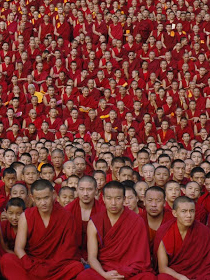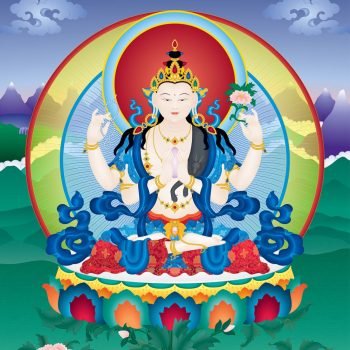- Home
- FPMT Homepage

Foundation for the Preservation of the Mahayana Tradition
The FPMT is an organization devoted to preserving and spreading Mahayana Buddhism worldwide by creating opportunities to listen, reflect, meditate, practice and actualize the unmistaken teachings of the Buddha and based on that experience spreading the Dharma to sentient beings. We provide integrated education through which people’s minds and hearts can be transformed into their highest potential for the benefit of others, inspired by an attitude of universal responsibility and service. We are committed to creating harmonious environments and helping all beings develop their full potential of infinite wisdom and compassion. Our organization is based on the Buddhist tradition of Lama Tsongkhapa of Tibet as taught to us by our founders Lama Thubten Yeshe and Lama Thubten Zopa Rinpoche.
- Willkommen
Die Stiftung zur Erhaltung der Mahayana Tradition (FPMT) ist eine Organisation, die sich weltweit für die Erhaltung und Verbreitung des Mahayana-Buddhismus einsetzt, indem sie Möglichkeiten schafft, den makellosen Lehren des Buddha zuzuhören, über sie zur reflektieren und zu meditieren und auf der Grundlage dieser Erfahrung das Dharma unter den Lebewesen zu verbreiten.
Wir bieten integrierte Schulungswege an, durch denen der Geist und das Herz der Menschen in ihr höchstes Potential verwandelt werden zum Wohl der anderen – inspiriert durch eine Haltung der universellen Verantwortung und dem Wunsch zu dienen. Wir haben uns verpflichtet, harmonische Umgebungen zu schaffen und allen Wesen zu helfen, ihr volles Potenzial unendlicher Weisheit und grenzenlosen Mitgefühls zu verwirklichen.
Unsere Organisation basiert auf der buddhistischen Tradition von Lama Tsongkhapa von Tibet, so wie sie uns von unseren Gründern Lama Thubten Yeshe und Lama Thubten Zopa Rinpoche gelehrt wird.
- Bienvenidos
La Fundación para la preservación de la tradición Mahayana (FPMT) es una organización que se dedica a preservar y difundir el budismo Mahayana en todo el mundo, creando oportunidades para escuchar, reflexionar, meditar, practicar y actualizar las enseñanzas inconfundibles de Buda y en base a esa experiencia difundir el Dharma a los seres.
Proporcionamos una educación integrada a través de la cual las mentes y los corazones de las personas se pueden transformar en su mayor potencial para el beneficio de los demás, inspirados por una actitud de responsabilidad y servicio universales. Estamos comprometidos a crear ambientes armoniosos y ayudar a todos los seres a desarrollar todo su potencial de infinita sabiduría y compasión.
Nuestra organización se basa en la tradición budista de Lama Tsongkhapa del Tíbet como nos lo enseñaron nuestros fundadores Lama Thubten Yeshe y Lama Zopa Rinpoche.
A continuación puede ver una lista de los centros y sus páginas web en su lengua preferida.
- Bienvenue
L’organisation de la FPMT a pour vocation la préservation et la diffusion du bouddhisme du mahayana dans le monde entier. Elle offre l’opportunité d’écouter, de réfléchir, de méditer, de pratiquer et de réaliser les enseignements excellents du Bouddha, pour ensuite transmettre le Dharma à tous les êtres. Nous proposons une formation intégrée grâce à laquelle le cœur et l’esprit de chacun peuvent accomplir leur potentiel le plus élevé pour le bien d’autrui, inspirés par le sens du service et une responsabilité universelle. Nous nous engageons à créer un environnement harmonieux et à aider tous les êtres à épanouir leur potentiel illimité de compassion et de sagesse. Notre organisation s’appuie sur la tradition guéloukpa de Lama Tsongkhapa du Tibet, telle qu’elle a été enseignée par nos fondateurs Lama Thoubtèn Yéshé et Lama Zopa Rinpoché.
Visitez le site de notre Editions Mahayana pour les traductions, conseils et nouvelles du Bureau international en français.
Voici une liste de centres et de leurs sites dans votre langue préférée
- Benvenuto
L’FPMT è un organizzazione il cui scopo è preservare e diffondere il Buddhismo Mahayana nel mondo, creando occasioni di ascolto, riflessione, meditazione e pratica dei perfetti insegnamenti del Buddha, al fine di attualizzare e diffondere il Dharma fra tutti gli esseri senzienti.
Offriamo un’educazione integrata, che può trasformare la mente e i cuori delle persone nel loro massimo potenziale, per il beneficio di tutti gli esseri, ispirati da un’attitudine di responsabilità universale e di servizio.
Il nostro obiettivo è quello di creare contesti armoniosi e aiutare tutti gli esseri a sviluppare in modo completo le proprie potenzialità di infinita saggezza e compassione.
La nostra organizzazione si basa sulla tradizione buddhista di Lama Tsongkhapa del Tibet, così come ci è stata insegnata dai nostri fondatori Lama Thubten Yeshe e Lama Zopa Rinpoche.
Di seguito potete trovare un elenco dei centri e dei loro siti nella lingua da voi prescelta.
- 欢迎 / 歡迎
简体中文
“护持大乘法脉基金会”( 英文简称:FPMT。全名:Foundation for the Preservation of the Mahayana Tradition) 是一个致力于护持和弘扬大乘佛法的国际佛教组织。我们提供听闻,思维,禅修,修行和实证佛陀无误教法的机会,以便让一切众生都能够享受佛法的指引和滋润。
我们全力创造和谐融洽的环境, 为人们提供解行并重的完整佛法教育,以便启发内在的环宇悲心及责任心,并开发内心所蕴藏的巨大潜能 — 无限的智慧与悲心 — 以便利益和服务一切有情。
FPMT的创办人是图腾耶喜喇嘛和喇嘛梭巴仁波切。我们所修习的是由两位上师所教导的,西藏喀巴大师的佛法传承。
繁體中文
護持大乘法脈基金會”( 英文簡稱:FPMT。全名:Found
ation for the Preservation of the Mahayana Tradition ) 是一個致力於護持和弘揚大乘佛法的國際佛教組織。我們提供聽聞, 思維,禪修,修行和實證佛陀無誤教法的機會,以便讓一切眾生都能 夠享受佛法的指引和滋潤。 我們全力創造和諧融洽的環境,
為人們提供解行並重的完整佛法教育,以便啟發內在的環宇悲心及責 任心,並開發內心所蘊藏的巨大潛能 — 無限的智慧與悲心 – – 以便利益和服務一切有情。 FPMT的創辦人是圖騰耶喜喇嘛和喇嘛梭巴仁波切。
我們所修習的是由兩位上師所教導的,西藏喀巴大師的佛法傳承。 察看道场信息:
- FPMT Homepage
- News/Media
-
- Study & Practice
-
-
- About FPMT Education Services
- Latest News
- Programs
- New to Buddhism?
- Buddhist Mind Science: Activating Your Potential
- Heart Advice for Death and Dying
- Discovering Buddhism
- Living in the Path
- Exploring Buddhism
- FPMT Basic Program
- FPMT Masters Program
- FPMT In-Depth Meditation Training
- Maitripa College
- Lotsawa Rinchen Zangpo Translator Program
- Universal Education for Compassion & Wisdom
- Online Learning Center
-
- Prayers & Practice Materials
- Overview of Prayers & Practices
- Full Catalogue of Prayers & Practice Materials
- Explore Popular Topics
- Benefiting Animals
- Chenrezig Resources
- Death & Dying Resources
- Lama Chopa (Guru Puja)
- Lama Zopa Rinpoche: Compendium of Precious Instructions
- Lama Zopa Rinpoche: Life Practice Advice
- Lama Zopa Rinpoche Practice Series
- Lamrim Resources
- Mantras
- Prayer Book Updates
- Purification Practices
- Sutras
- Thought Transformation (Lojong)
- Audio Materials
- Dharma Dates - Tibetan Calendar
- Translation Services
- Publishing Services
- Ways to Offer Support
- Prayers & Practice Materials
-
- Teachings and Advice
- Find Teachings and Advice
- Lama Zopa Rinpoche Advice Page
- Lama Zopa Rinpoche: Compendium of Precious Instructions
- Lama Zopa Rinpoche Video Teachings
- ༧སྐྱབས་རྗེ་བཟོད་པ་རིན་པོ་ཆེ་མཆོག་ནས་སྩལ་བའི་བཀའ་སློབ་བརྙན་འཕྲིན།
- Podcasts
- Lama Yeshe Wisdom Archive
- Buddhism FAQ
- Dharma for Young People
- Resources on Holy Objects
- Teachings and Advice
-
-
*If a menu item has a submenu clicking once will expand the menu clicking twice will open the page.
-
-
- Centers
-
- Teachers
-
- Projects
-
-
-
-
*If a menu item has a submenu clicking once will expand the menu clicking twice will open the page.
-
-
- FPMT
-
-
-
-
-
Cherishing others opens the door to every happiness for self and others.
Lama Zopa Rinpoche
-
-
-
- Shop
-
-
-
The Foundation Store is FPMT’s online shop and features a vast selection of Buddhist study and practice materials written or recommended by our lineage gurus. These items include homestudy programs, prayers and practices in PDF or eBook format, materials for children, and other resources to support practitioners.
Items displayed in the shop are made available for Dharma practice and educational purposes, and never for the purpose of profiting from their sale. Please read FPMT Foundation Store Policy Regarding Dharma Items for more information.
-
-
FPMT Community: Stories & News
17
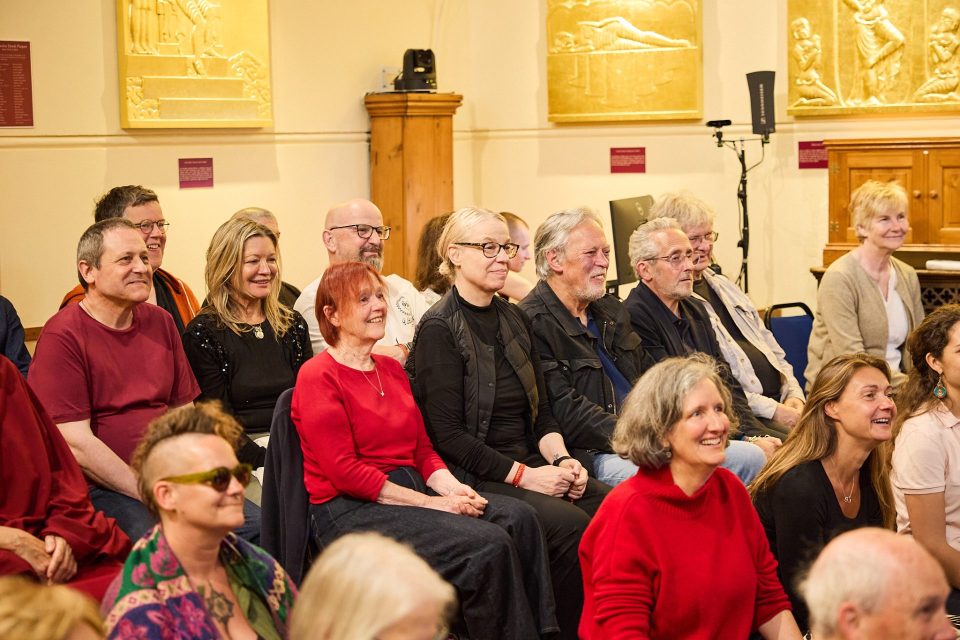
Participants in a community event at Jamyang London. Photo courtesy of Jamyang London.
By Paul Wells, Jamyang London Communications Manager
In a move that reflects the evolving needs of modern Dharma centers, FPMT’s Jamyang London has created a new People & Community Manager role. Like many spiritual organizations, we’ve seen that sustaining the Dharma depends as much on community and volunteer work as it does on teachers and teachings.
Like all FPMT centers, Jamyang’s primary mission is spiritual. The work of preserving and sharing the Buddha’s teachings, supporting sincere practitioners, and fulfilling the vast vision of our lineage masters is at the heart of everything. But over time, a secondary mission has emerged—one that makes the first mission possible. That is, the ability to host, care for, and organize a community of people who offer their time, skills, and service in the spirit of generosity.
Volunteers cook meals, sweep the gompa, water the garden, run the bookshop, and welcome new faces. They are the living infrastructure of the center. And yet, many organizations rely on ad hoc or overstretched and outdated systems to support them. Taking a conscious and vital step in a new direction, is one of the ways in which we can repay the kindness of those who offer service.
The People & Community Manager role is designed to give shape and care to this area of the center’s life. It will provide structure to the volunteer experience, ensure inclusion and accessibility, and offer clear pathways for people to connect and contribute meaningfully, which is ever more important as people lean in to offer service not just in the building, but remotely and digitally too. It’s a role that recognizes the power of relationship and the deep interdependence between those who serve and those who receive.
“As Dharma centers we often focus on the what —bringing the precious teachings to the community. But how we do this matters just as much. It’s where we apply our Dharma principles. That’s why creating the right conditions to support those who tirelessly offer service is so critical.” says Jamyang’s Executive Director, Ven. Thubten Drolma, “We feel enormously fortunate to be able to create a role dedicated to supporting the people who make everything possible.”
The creation of this role takes seriously the often-invisible work of holding community, and investing in the systems and people that make it thrive. This new role marks a hopeful step in recognizing the quiet systems that make spiritual community possible. It affirms the value of service, supports harmony and longevity, the need for thoughtful coordination, and the beauty of supporting one another with care and clarity. It’s a role that says: we see you, we value your service, and we want to do it better—for everyone.
Written by Paul Wells, Communications Manager for Jamyang London. Jamyang is very happy to offer more information about the development of their People & Community Manager role, should any FPMT center wish to pursue creating a position like this to suit their own community’s needs.
We welcome the submission of news stories from those within the FPMT community. This can be a story about something you have personally completed or accomplished, about someone else who has done so, or about the FPMT center, project, or service of which you are a part. Ideal submissions will give readers reasons to rejoice, share ideas, and create connections between those in the international community. Have something to share? Please let us know!
Foundation for the Preservation of Mahayana Tradition (FPMT), is a Tibetan Buddhist organization dedicated to the transmission of the Mahayana Buddhist tradition and values worldwide through teaching, meditation and community service.
- Tagged: jamyang london
14
Tara Lanka’s Pilgrimage to Sri Pada Mountain
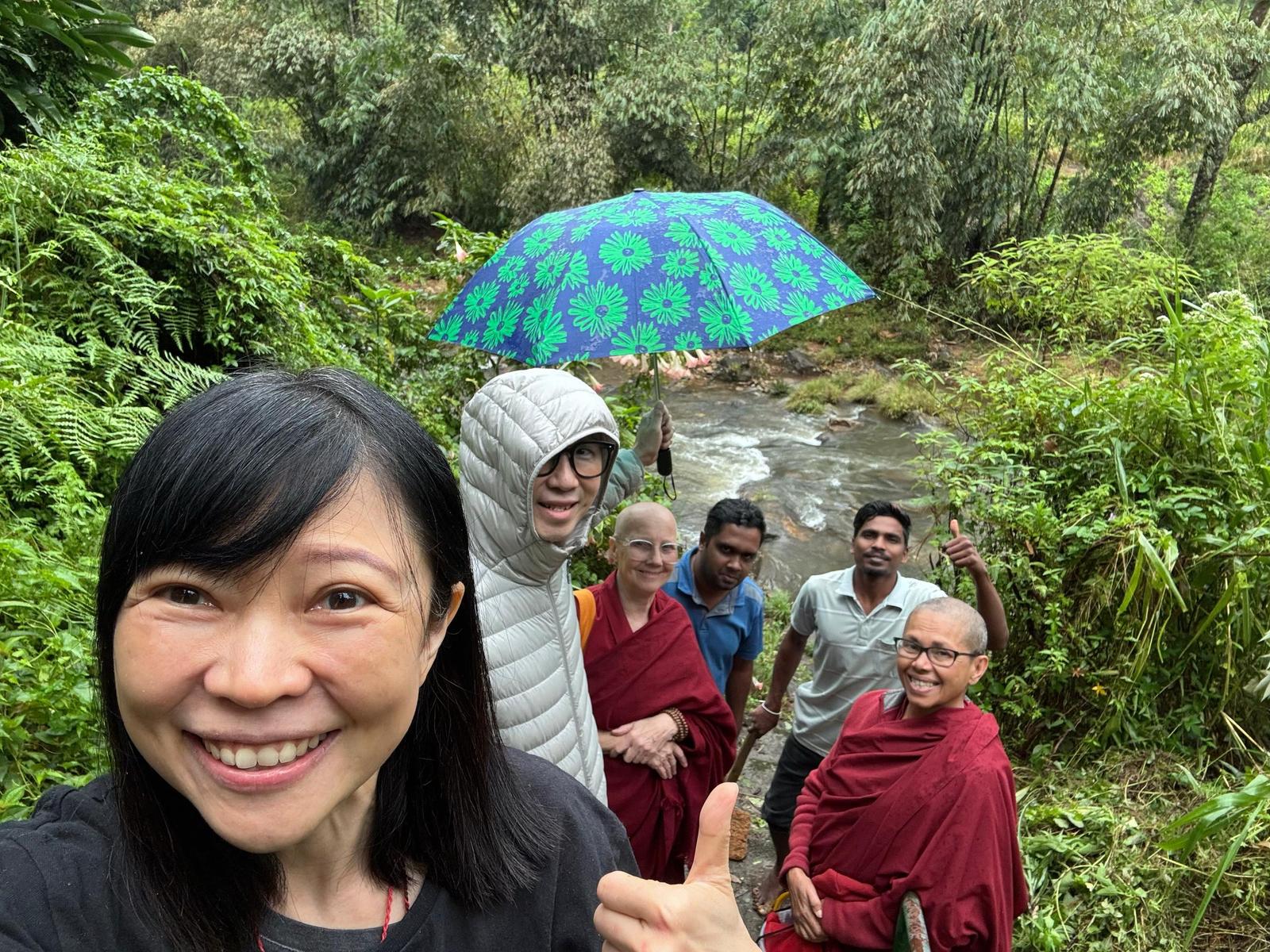
Pilgrimage participants after planting an Earth Treasure Vase on Sri Pada mountain in Sri Lanka, April 2025. Photo courtesy Tara Lanka Study Group.
A Sacred Climb: Pilgrimage to Sri Pada
By Ven. Tenzin Lekdron
In April 2025, a small but determined group of seven pilgrims gathered in Sri Lanka to ascend the sacred mountain Sri Pada—known also as Adam’s Peak, Mount Malaya, or Samanala Kanda. The journey was not just physical but deeply spiritual, resulting from a request by Palchen Rinpoche who had been unable to travel from Tibet. His students in Singapore entrusted an Earth Treasure Vase (meant for replenishing the Earth) to FPMT Tara Lanka Study Group, requesting it be buried near Sri Pada as part of a global healing practice.
For two years, attempts were made to find a qualified lama to do the burial ritual—until Geshe Rabten of the FPMT Atisha Centre in Bendigo, Australia, told me: “You must do it.”
Thus began a journey marked by obstacles. The pilgrimage season was ending, the rains had begun, and some original participants withdrew due to illness or misunderstandings. Friends become strangers. At one point, it seemed the climb would be a solitary one. And yet, two strangers from Malaysia joined at the last minute, drawn by their devotion to Guru Rinpoche.
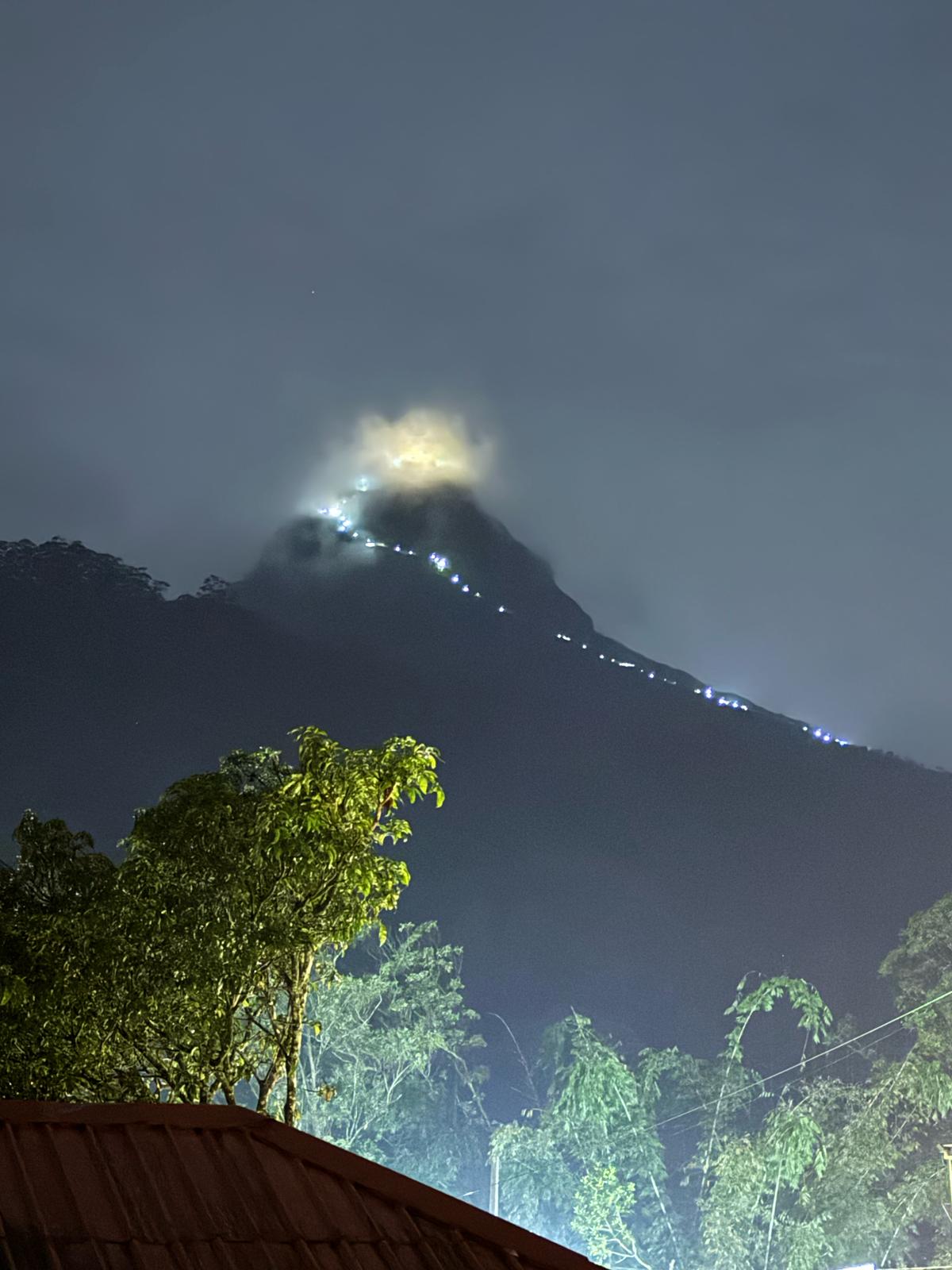
View of Sri Pada mountain at night. Photo courtesy Ven. Tenzin Lekdron.
Ven. Dechen Molly recalls the surreal beauty of the moment: “We knelt side by side in silence. The air was charged with blessing.” But it was no small feat. “The descent was brutal on the knees. We walked backwards at times, like climbing down a ladder.”
Despite the fatigue, the pilgrims completed their mission. Between cloudbursts, they buried the Earth Treasure Vase. Prayers continued, and in an act of compassion, a chicken destined for slaughter was bought and released.
For Eddie, the pilgrimage became a lesson in letting go. “I kept waiting to ‘arrive’—at the summit, at breakfast, at rest. But that desire for resolution kept me from seeing the moment. I realized the journey was the goal.” Ven. Dechen added with a smile, “And the veggie burger made with banana flower? Absolutely delicious.”
It was also extra special for three Sri Lankan pilgrims. Ruwan Basnayaka said, ”Although I had climbed Sri Pada before, this time it had a bonus attached as we were connecting with the second Buddha, Guru Padmasambhava. During the practices we felt the energy and constant reminders from the two nuns —to remember we are climbing on behalf of all sentient beings— made me think differently about the physical hardship.”
The ripple effects of the pilgrimage are still unfolding. New locations, fresh enthusiasm, and revived Dharma efforts now mark the work of Tara Lanka Study Group. What began with uncertainty has become a story of perseverance, interdependence, and the spontaneous blessings that arise when intention meets faith.
To me, this was never just about climbing a mountain. It was about removing obstacles—personal, logistical, spiritual. And since returning, stalled projects have begun to move forward. One of the projects is the sponsorship of the revised translation of one of the island’s greatest unsung treasures from its ancient past, the Manjusri Vasthu Vidya Shasthra, the only version discovered anywhere. This text contains instructions for building Buddhist monastic complexes and Buddha statues, and is a very important text showing the extent of Mahayana practice in Sri Lanka. This stalled project is moving again with Sri Lankan scholar Bertram Liyanage’s incredible help with Sanskrit and English corrections, and the kind generosity of a sponsor.
The Earth Treasure Vase now rests in the shadow of Sri Pada, surrounded by the wild forest and sacred echoes. The journey continues—for the mountain, the pilgrims, and the island itself.
Venerable Tenzin Lekdron is a Sri Lankan-born Australian Buddhist nun in the Tibetan tradition. A long standing student of Lama Zopa Rinpoche, she was ordained by His Holiness the Dalai Lama in 2016. She founded the Tara Lanka Foundation to create unification and harmony across Theravada and Mahayana Buddhist traditions. For the past three years, she has been working on making Lama Zopa’s vision for healing and unity a reality by raising funds for archeological research and documentation of Mahayana traditions that have been lost over time. In 2023, Lama Zopa Rinpoche gave her the significant task of bringing Baisajyaguru (Medicine Buddha) back to Sri Lanka.
Please read a previously published story about a pilgrimage Ven. Lekdron led in Sri Lanka to raise funds for the 5MB Project, a mission to build a five-story high Medicine Buddha statue in Sri Lanka, according to the instructions of Lama Zopa Rinpoche.
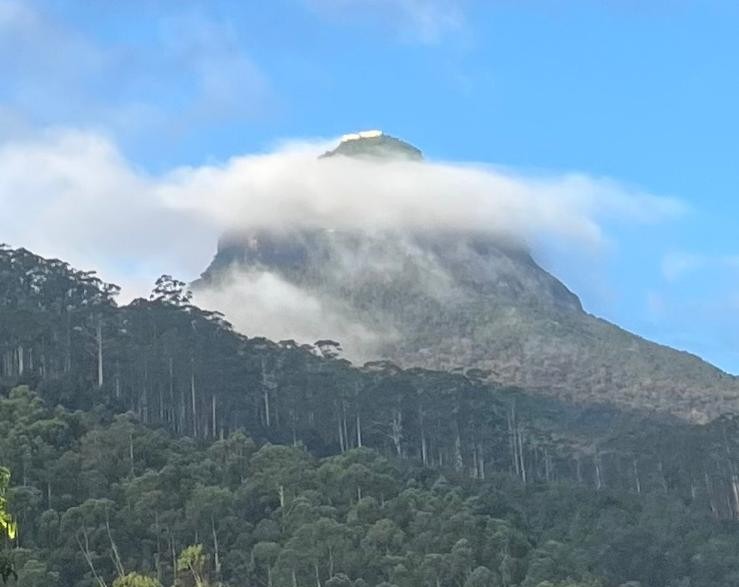
Sri Pada mountain, the place where the Buddha taught the Lankavatara Sutra. Photo courtesy Tara Lanka Study Group.
Reminiscences of a Sri Pada Pilgrim
By Eddie Yap
Wow! Wow! Wow! Echoes of Kyabje Lama Zopa Rinpoche’s voice were vividly heard in my mind. As we sat together at the café of Adam’s Peak Inn on a rainy afternoon after the hike, we shared our experiences of the amazing hike of Sri Pada. It is unfathomable because of the auspicious causes and conditions that brought us together and the perfect weather conditions that we enjoyed during the hike. As cliché as it sounds, we felt like in a dream and an illusion…
Adam’s Peak or Sri Pada has a height of 2,243 metre (7,359 feet). The ascent to the peak takes 5,500 steps, measuring about 7.5 km (4.5 miles) in distance. The mountain is also known as Mount Malaya, where the Buddha Shakyamuni taught the Mahayana Lankavatara Sutra. This incredible sacred site also marks the origin of Vajrayana teachings. For more information about the mountain, please refer to www.nekhor.org and Wikipedia.
On April 9, 2025, at 12:30 a.m. we started our walk from the Adam’s Peak Inn to the foothill of the Sri Pada. We reached the peak about 5:30 a.m., just in time for paying homage at the temple. We did our prayers and watched the sunrise at 6 a.m. We started to descend around 6:30 a.m. and each of us arrived at the Adam’s Peak Inn at varied times. It took me about 9 hours to complete the entire pilgrimage of Sri Pada. I am indeed grateful for the blessings of my Guru and Three Jewels, Venerable Lekdron, Venerable Dechen, and to my fellow pilgrims who showered me with unconditional love, joy, support, and care.
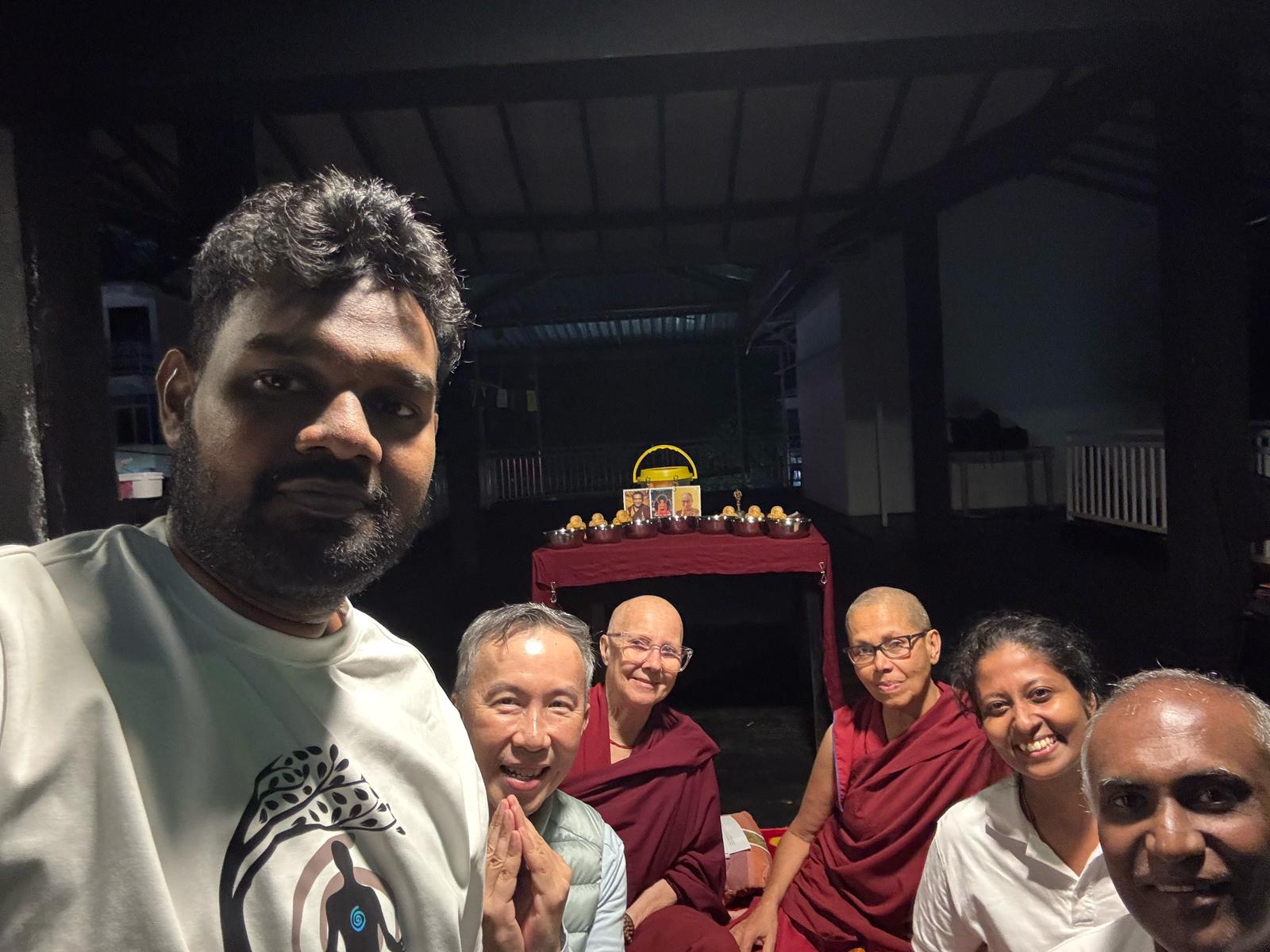
Pilgrimage participants completing prayers before climbing Sri Pada mountain. Photo courtesy Tara Lanka Study Group.
As indescribably fruitful as the midnight hike is for my inner transformation, I was perturbed with anxiety and doubts in the beginning. My thoughts were like… what if I can’t cope with lack of sleep and fatigue? Will my knapsack be too heavy if I pack too much water, warm clothes, medicine, etc.? Will it rain? Will it be very crowded with pilgrims on the way up like what I saw on YouTube? Countless ruminations on my mind that I cannot even recall.
If you ask me how I did it, I cannot pinpoint any specific method. Perhaps Nike’s slogan of “Just do it” helps; or our team camaraderie, brimming with love and care that pushed me to take another step after another. Or when I was stuck halfway, I had no choice but to continue. Or perhaps meeting an 80-year-old lady who hiked Sri Pada eight times in her life, descending a step at a time in the dark of the night with much joy and vigor that inspired me. It is awe inspiring to witness various causes and conditions working together … I think I am in control and yet I am vulnerable too. So, I just suck it up and take a moment to reflect on the wondrous opportunity that I am experiencing. Maybe it is not about reaching the summit that really matters. It is the journey. Pausing, enjoying the surrounding, laughing, succumbing to the pain of fatigued muscles, taking deep breaths and marveling at how far I have climbed and descended.
Along the way, Ven. Lekdron gently reminded me of our altruistic aspirations. For the benefit of all sentient beings, may all beings have happiness and its causes, may all beings be free from suffering and its causes. Think of the six classes of beings who are with us on this journey. Any pain that I feel is far less than those felt by hell beings. Bodhichitta, the essence of Buddha Dharma, is my inconceivable propulsion. Balancing my capacity to help others and myself is a constant juggle. I have learnt to be compassionate to my experiences and allow changes to happen. During the hike, I am reminded of the airplane emergency procedures. I must wear the oxygen mask first, then help others. I have to be safe before helping others, I have to be kind to myself to be kind to others.
The nine-hour journey is filled with lucid and transient sweet and bitter moments. Truly exceptional opportunities to discover endless discomfort that came and went. When I was on my way up, I thought of when I would reach the top and, on my way down, when would I arrive at the Inn for a warm breakfast. Dissatisfaction pervaded my state of mind. Habitually, I was not contented with every moment of my experience. As long as I wanted a preconceived and permanent outcome, I was dissatisfied.
I recalled the inspiring stories of Ven. Lekdron and Ven. Dechen over our meals together. Their relentless pursuit of Dharma activities and the numerous challenges that they had to deal with. Perhaps the goal is the path. Perhaps I shall appreciate the spontaneity of each moment of experience. Discover the transitory nature of life. Not everything has to make sense from my meager perspective. Live a larger life. It is not always about me. Whatever I feel or perceive is only a minute part of what it really is. My experience is dependent on a multitude of factors that I cannot possibly know. Learn to live with discomfort and dissatisfaction as the path. I do not need to create pleasant experience. Be open to all experiences. Appreciate the interdependence, ever changing and multiple outcomes of causes and conditions. Be in love with the world. Be creative. Be kind.
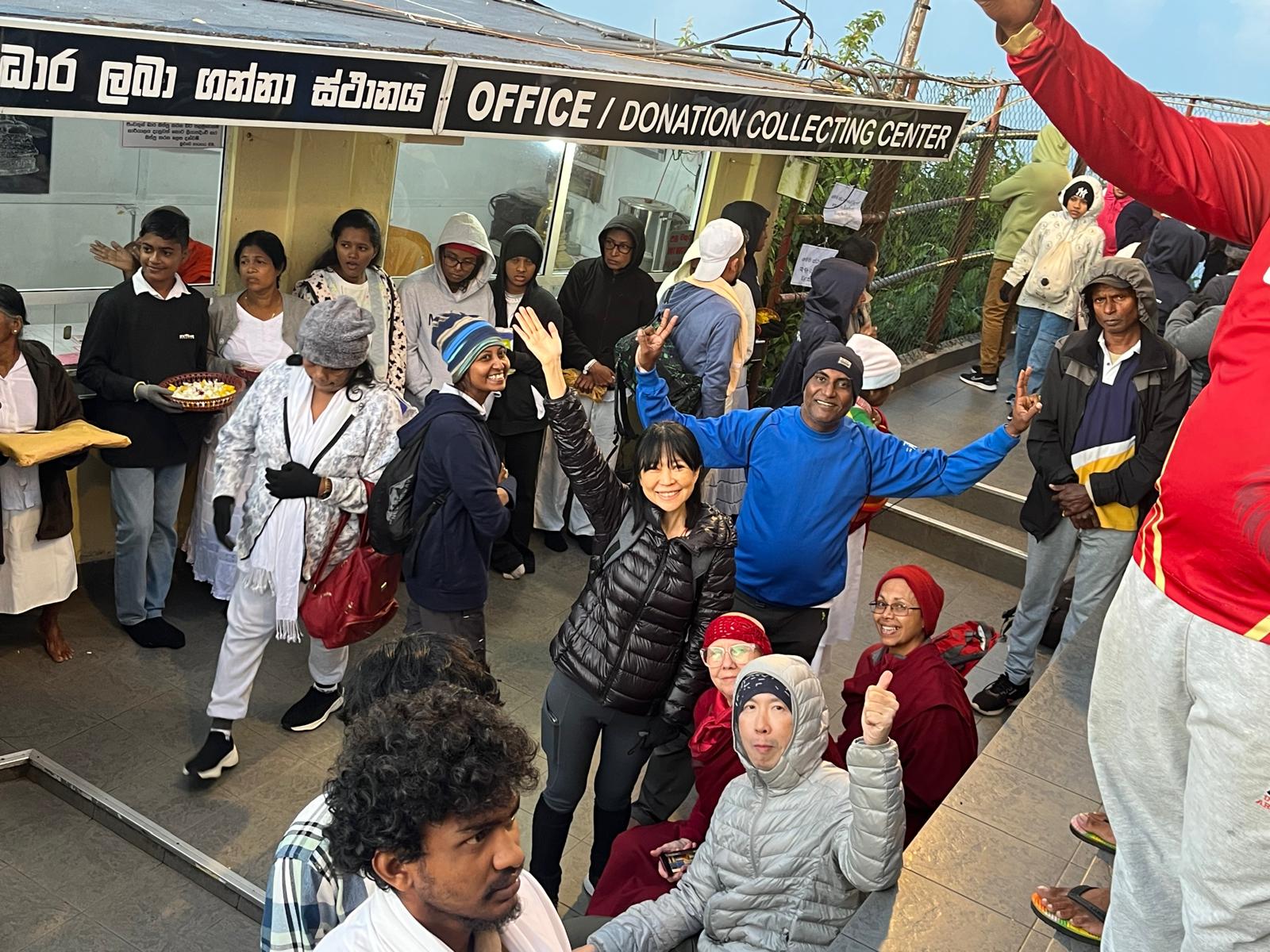
Tara Lanka Study Group pilgrimage participants at the summit of Sri Pada mountain. Photo courtesy Tara Laka Study Group.
I wish to extend my heartfelt gratitude to the wise and compassionate Ven. Lekdron and Ven. Dechen for their guidance and teachings. It is an amazing experience to eat and live with unique and exemplary bodhisattvas like them. It is certainly a wish fulfilling pilgrimage that I have much to learn from. My experience at Sri Pada would not be as lovely and memorable without the love, care and unwavering support from my fellow pilgrims who I am truly thankful for. The journey continues…
Humbly with lots of love,
Eddie
Eddie Yap lives in Malaysia and is a member of Losang Dragpa Center in Kuala Lumpur, Malaysia. He has traveled to many sacred sites of Guru Rinpoche (Padmasambhava).
We welcome the submission of news stories from those within the FPMT community. This can be a story about something you have personally completed or accomplished, about someone else who has done so, or about the FPMT center, project, or service of which you are a part. Ideal submissions will give readers reasons to rejoice, share ideas, and create connections between those in the international community. Have something to share? Please let us know!
Foundation for the Preservation of Mahayana Tradition (FPMT), is a Tibetan Buddhist organization dedicated to the transmission of the Mahayana Buddhist tradition and values worldwide through teaching, meditation and community service.
- Tagged: sri lanka, tara lanka study group
10
Ask a Teacher: Addressing Doubt
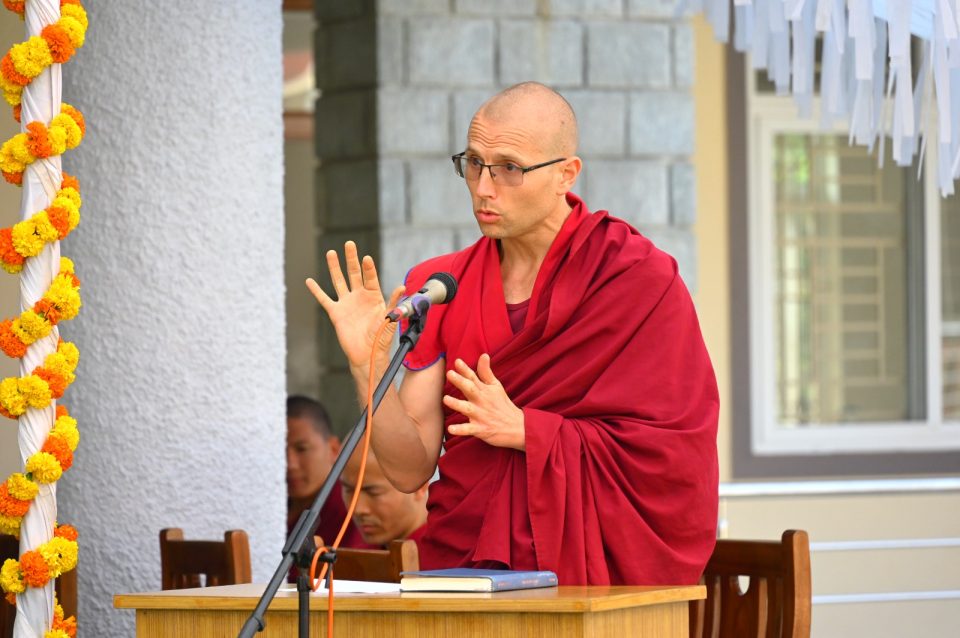
Ven. Gache explaining quantum physics to the senior monks at Sera Jey, January 2024/
Ven. Tenzin Gache, FPMT registered teacher and current director of Sera IMI House in South India, recently took the time to thoughtfully answer this question from a student: “How can we gain confidence in aspects of the Buddha’s teachings that are not accessible to our perception, for example, reincarnation?” As this question is familiar to all of us wishing to establish deep faith in Buddha’s teachings, we share his full answer below.
Addressing Doubt in the Buddha’s Teachings
By Ven. Tenzin Gache
Tibetan Buddhists in general, and especially followers of Je Tsongkhapa, consider themselves inheritors of the “Nalanda Tradition” that arose in ancient India. The trademark approach is critical investigation, rather than reliance on faith and adherence to established conventions. To question fundamental tenets of the Buddha’s teachings is not considered “bad karma” but is instead a dutiful display of respect for the lineage. This attitude is reflected in these passages, two attributed to the Buddha himself, and one from a contemporary master:
“It is fitting for you to be perplexed, Kalamas, fitting for you to be in doubt. Doubt has arisen in you about a perplexing matter. Come, Kalamas, do not go by oral tradition, by lineage of teaching, by hearsay, by a collection of scriptures, by logical reasoning, by inferential reasoning, by reasoned cogitation, by the acceptance of a view after pondering it, by the seeming competence [of a speaker], or because you think ‘the ascetic is our guru.’ But when you know for yourselves: ‘These things are wholesome; these things are blameless; these things are praised by the wise; these things, if accepted and undertaken, lead to welfare and happiness,’ then you should live in accordance with them.”[1] [“Logical reasoning” here is understood as reasoning divorced from empirical investigation, and does not imply that reasoning in general is not a necessary tool.]
Oh monks and scholars, as you would
test gold by burning, cutting, and
by rubbing it, just so accept
my words: not through respect for me.[2]
If scientific analysis were conclusively to demonstrate certain claims in Buddhism to be false, then we must accept the findings of science and abandon those claims.[3]
The Nalanda masters identified two possible approaches to the teachings: the “dull faculty” approach of faith or trust in a person, and the “sharp faculty” approach of critical analysis and trust in reasoning. Those who employ the first approach gain faith and enter the path more quickly, but those taking the second approach eventually gain an unshakable faith and, though slower to begin the path, will ultimately reach enlightenment far more quickly.
The second quotation above is seen as the source for the “sharp” approach, and later masters such as Aryadeva and Dharmakirti broke the advice into three parts, corresponding to three levels of analysis for three potential objects of knowledge:
- “Burning” symbolizes testing the manifestly obvious aspects of the teachings against our direct experience. If we can verify through sense consciousness (including with a microscope) that something the Buddha said does not accord with reality, we can and should discard it.
- “Cutting” symbolizes testing the slightly hidden aspects of the teachings against reason. The Buddha may have spoken of something we cannot directly experience, yet this teaching does not withstand reasoned analysis, we can discard it.
- “Rubbing” symbolizes checking the very hidden aspects of the teachings for internal contradiction. In some cases, the Buddha may have spoken of something that is only accessible to clairvoyance. We might not be able to test it against our experience or against reason, but if the teaching contradicts itself or another teaching the Buddha gave, we can put it aside.
A key point here is that it is considered inappropriate to employ a later stage of analysis at an earlier step. For example, if something is accessible to reasoning, we cannot appeal to textual authority to verify it. This is not simply a rule but reflects the stepwise approach. We always start with the earlier stages, so if something was accessible to reason, we would have already confirmed or rejected it before reaching the last stage. We only appeal to authority when something is beyond our ability to reason—and even then, we do so only with significant caution, as I will explain below.
The heart of the Buddha’s teachings is the four noble truths, and this teaching is the fulcrum upon which we weigh the other teachings. The four noble truths are a slightly hidden phenomenon, accessible to reason. If we have not used reason to establish these, then we have no basis for judging more esoteric claims. Critically, the teaching on karma and reincarnation forms an essential element of the four truths, as the interplay between the origin of suffering—karma and delusion—and the resultant suffering—aggregates arising under the power of karma and delusion. Reincarnation is something we must approach through critical analysis and not by appeal to the Buddha or someone else’s authority.
This point is sometimes misunderstood because certain teachings on karma are used as examples of very hidden phenomena. But the important distinction is between an understanding of karma in general rather than the result of a particular action. For example, in one sutra the Buddha claims that a particular lay supporter will be reborn as a monkey due to derogatorily calling an arhat a monkey. Although we can understand in a general sense that a concordant cause might lead to a particular concordant result, to know with certainty the result of any action we would need to know the details of all the myriad factors involved. What was the motivation behind the statement? Did the speaker regret it afterward? What other actions did he do in this or other lives that might be more powerful and override this action as the cause for the next birth? These are questions that can only be answered with profound clairvoyance. This distinction is analogous to predicting the weather—we can establish through reason and investigation the general patterns of meteorology, and make informed estimates about next week’s weather, but to know for sure that there will be a thunderstorm on Sunday would require knowing a nearly infinite interplay of causes.
If karma and reincarnation are accessible to reasoning, how can we approach them? The traditional teachings speak of employing either reason or scriptural quotation, but I think that today we can also talk about appeal to evidence. Ultimately our interpretation of evidence will depend on our use of reasoning, but gathering evidence in support of a hypothesis is in line with the dictum that we first appeal to direct perception. There is a wealth of high-quality evidence available, and a good introduction to the field can be found in Rebirth in Early Buddhism & Current Research by Bhikkhu Analayo.[4]
To use reasoning, we can first step back and ask, “What kind of world would have to be possible to allow for reincarnation?” A universe functioning solely according to the laws of classical physics would not allow for a nonmaterial mind to have any causal efficacy in the material world. Furthermore, a purely material mind—one that is either identical with, or a byproduct of, the brain—would not exist before birth and would cease at the time of death. These two notions—a classical universe and a material mind—are both ones that we can approach through reasoning and study of the available evidence. As serious practitioners of Buddhism, it is our responsibility to pursue such an approach, rather than appeal to either the authority of traditional Buddhist masters on the one side, or modern materialist scientists and philosophers on the other. This issue is too critical to the heart of Buddhism—to the truth or untruth of the four noble truths—for us to decide on hearsay. It is beyond the scope of this current essay to address the argument in detail, so I will do so in a subsequent one. The key point is that such investigation is not a diversion from serious practice but constitutes the practice of analytical meditation. The Buddha described practice as comprising study, contemplation, and meditation. What subject is more crucial to study and contemplate than the four noble truths? Liberation in Buddhism comes through wisdom seeing things as they are, not through reciting the right mantra formula or abiding in single-pointed concentration. These other practices can be utilized as powerful supplements for the development of wisdom but are not intended as replacements.
Finally, we come to the question of how to examine very hidden phenomena. Predicting specific details of karmic causation, like unfolding weather patterns, requires detailed knowledge of seemingly countless causes and conditions. Sense perception and even reasoned analysis alone cannot reveal these details. When the Buddha makes a claim about the karmic effect of a particular action, or the past cause leading to a present result, can we accept the statement as valid? The claim might not be “falsifiable” in the strict sense, but Nalanda masters developed tools that we can use to analyze the statement for potential flaws. Some traditional accounts speak of Mount Meru at the center of the universe. Mount Meru, if it exists, is not a very hidden phenomenon—it ought to be accessible to direct perception. If we use modern telescopes and other reliable devices and cannot perceive it, we can comfortably put such statements aside without controverting our adherence to Buddhist principles. We can also use modern methods of textual analysis to question the source of many statements, rather than assuming that any sutra attributed to the Buddha was indeed spoken by him. Tsongkhapa himself took such an approach in analyzing Indian texts, making maximum use of the tools available in fifteenth century Tibet.
In some sutras we see statements like “merely by reciting the name of Amitabha, you will be reborn in Sukhavati.” The Nalanda masters considered such a statement interpretable, meaning it cannot be taken literally because it contradicts teachings that can be verified by reasoning. If merely reciting the name of Amitabha led to birth in Sukhavati, there would be little need for cultivating ethical discipline, concentration, and insight. Karmic causation would essentially be nullified, because every other action a person did in their lifetime would have no bearing. The masters did not reject this statement but interpreted it in a nonliteral way. The teaching was meant for those who are easily discouraged, to uplift their spirits. The intention was not that simply reciting Amitabha’s name once would immediately lead to birth in Sukhavati after death, but that it would create a positive imprint that could lead to evolution over many, many lifetimes, eventually culminating in that result.
The Buddha’s claim that a particular lay adherent would be born as a monkey in the next life does not contradict his earlier teachings and is plausible within the framework of karmic causation. Does that mean that we can accept it? For one thing, to determine that it is plausible within that framework requires a deep understanding of the teachings on karma, and a conviction in their efficacy based on previous investigation. It also requires an understanding of what enlightenment is, and a conviction that the Buddha was an enlightened being. None of these points—the efficacy of karma, enlightenment in general, and even the Buddha’s enlightenment—is a very hidden phenomenon. Even if a practitioner has generated genuine valid cognition toward these points, it is questionable whether their conviction in the truth of the specific statement can ever reach the level of incontrovertibility that we can reach through reasoned analysis. The Geluk authors did indeed call such a conviction an “inference through belief,” but it is unclear whether Dharmakirti and his Indian contemporaries considered this sort of inference as on par with inference through the power of reason. In any case, we can be honest with ourselves about the limits of our knowledge. It is always possible that a statement attributed to the Buddha was not spoken by him. Even if it was, it is possible that he meant it in an allegorical way, as a skillful means to address the needs of disciples at the time. Even if it was meant literally, ascertaining its veracity hinges on conviction that the Buddha himself was infallible. This latter sort of conviction is not something that we can base on authority, but something that we must investigate with reasoning, taking us right back to the second stage of examining slightly hidden phenomena. Especially in the modern world, where there is a strong emphasis on questioning and reliable corroboration of unconventional claims, we as Buddhist practitioners cannot afford to lean on the authority of the past. We need courage and diligence to examine things for ourselves. We don’t pursue such examination just to convince others, but to confront our own doubt and work with our own minds. Doubt doesn’t leave us bewildered but clears a path that can lead to incontrovertible certainty when we are brave enough to follow that path as far as it will go.
Ven. Tenzin Gache is originally from Boston and graduated from Tufts University in 2005. During his college years he became a student of Lama Zopa Rinpoche and Choden Rinpoche. In 2006 he ordained with His Holiness the Dalai Lama, and has lived and studied at Sera Jey Monastery since that time. Currently he is in the final year of the standard geshe studies program, and next year will begin the intensive exams to qualify for the title of lharampa geshe.
[1] From the Kalama Sutta, found in Bhikkhu Bodhi, 2012. The Numerical Discourses of the Buddha. Boston: Wisdom Publications, p. 281.
[2] I have translated this verse from the Tibetan as it appears in Rje Tsong kha pa, 2002. Drang ba dang nges pa’i don rnam par ‘byed pa’i bstan bcos legs bshad snying po. Taiwan: The Corporate Body of the Buddha Educational Foundation, p. 3. Ironically, locating its original source within the Buddha’s teachings is a controversial matter, and most Tibetan scholars cited the quotation as it appears in an extant commentary by the Indian master Shantarakshita. Regardless of whether the Buddha made this exact statement, it certainly reflects themes he espoused in many other discourses.
[3] His Holiness the Dalai Lama, 2005. The Universe in a Single Atom. New York: Morgan Road Books, p. 3.
[4] Bhikkhu Analayo, 2018. Rebirth in Early Buddhism & Current Research. Boston: Wisdom Publications.
6
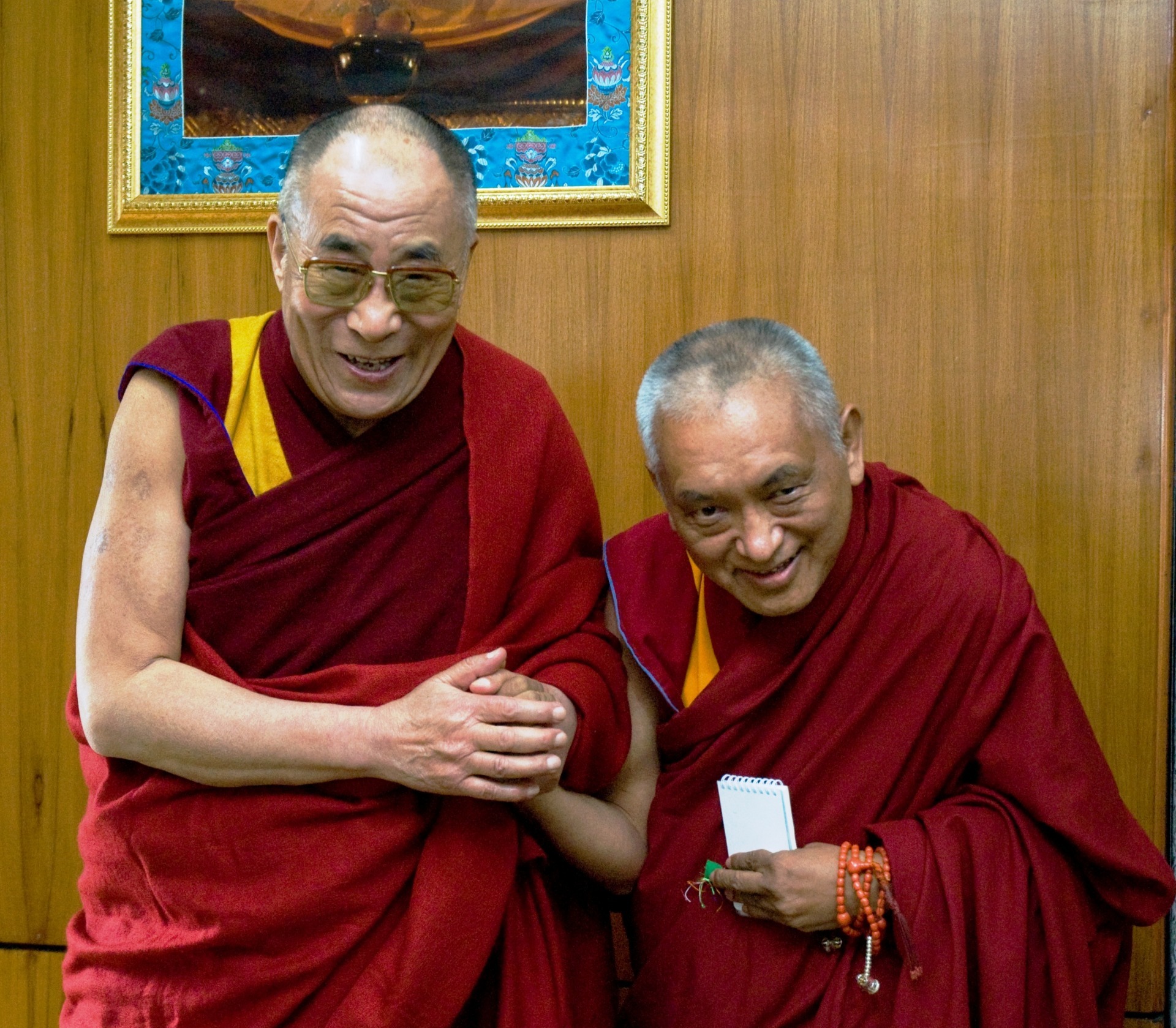
His Holiness the Dalai Lama with Lama Zopa Rinpoche, 2008.
We join students, friends, and admirers around the world in wishing His Holiness the Dalai Lama every good wish imaginable on his ninetieth birthday! A voice for the voiceless, a light in the dark, a complete and total manifestation of compassion for every living being—Your Holiness, please, please live long in this life; and in all future lives please continue to guide all of us who so desperately need your perfect example of kindness, patience, humility, and skillful means toward universal peace in the world.
For more on His Holiness the Dalai Lama and his beneficial activities, please visit DalaiLama.com.
Foundation for the Preservation of Mahayana Tradition (FPMT), is a Tibetan Buddhist organization dedicated to the transmission of the Mahayana Buddhist tradition and values worldwide through teaching, meditation and community service.
- Tagged: his holiness, his holiness the dalai lama
4
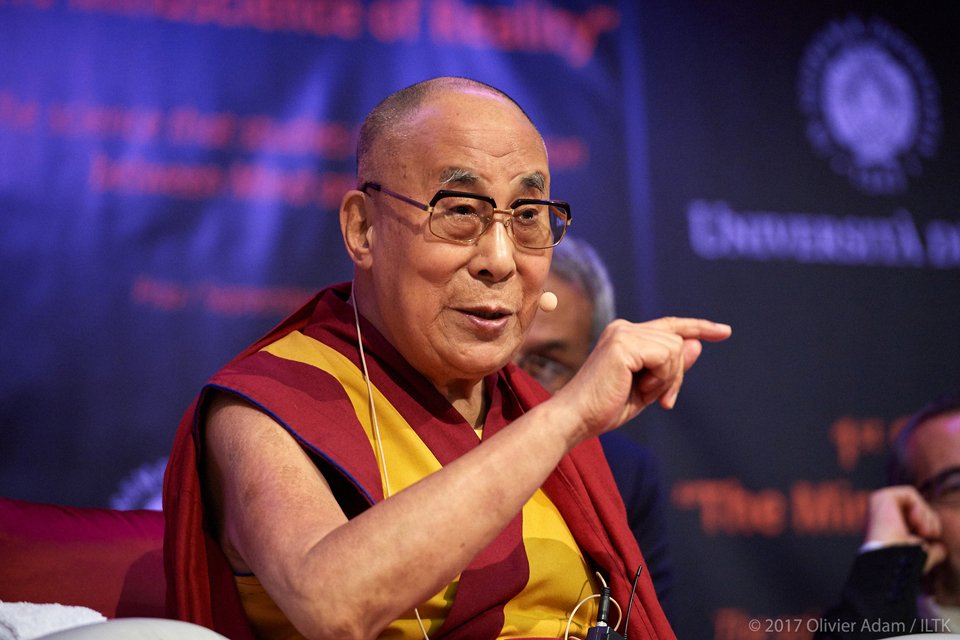
His Holiness the Dalai Lama at the Mind Science of Reality Symposium, organized by Istituto Lama Tzong Khapa and Università di Pisa, Pisa, Italy, September 2017. Photo by Olivier Adam.
The time has come for students, friends, and supporters around the world to join together in celebrating the ninetieth birthday of His Holiness the Fourteenth Dalai Lama of Tibet, which occurs this year on July 6, 2025. We recently shared several resources available to enrich your practice and observation of this special and auspicious day.
We also wanted to offer one more reminder to please REJOICE that the FPMT organization will be offering one hundred statues of Shakyamuni Buddha to His Holiness during a special long life puja for His Holiness on July 5 in Dharamsala! Five representatives from the FPMT community will be present to offer the statues. Please rejoice and read more about this offering.
About humanity’s need for love and compassion, His Holiness commented:
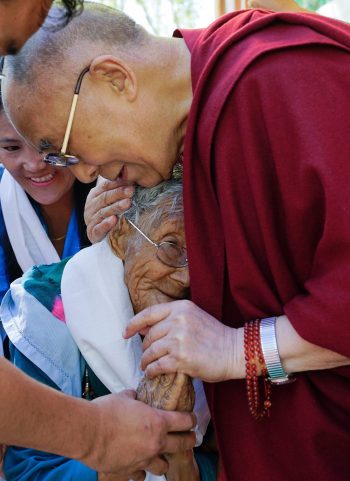
His Holiness the Dalai Lama comforts an elderly woman on the final day of his visit to Leh, Ladakh, India on August 24, 2016. (Photo by Tenzin Choejor/OHHDL)
“Ultimately, the reason why love and compassion bring the greatest happiness is simply that our nature cherishes them above all else. The need for love lies at the very foundation of human existence. It results from the profound interdependence we all share with one another. However capable and skillful an individual may be, left alone, he or she will not survive. However vigorous and independent one may feel during the most prosperous periods of life, when one is sick or very young or very old, one must depend on the support of others.
“Interdependence, of course, is a fundamental law of nature. Not only higher forms of life but also many of the smallest insects are social beings who, without any religion, law or education, survive by mutual cooperation based on an innate recognition of their interconnectedness. The most subtle level of material phenomena is also governed by interdependence. All phenomena from the planet we inhabit to the oceans, clouds, forests and flowers that surround us, arise in dependence upon subtle patterns of energy. Without their proper interaction, they dissolve and decay.
“It is because our own human existence is so dependent on the help of others that our need for love lies at the very foundation of our existence. Therefore we need a genuine sense of responsibility and a sincere concern for the welfare of others.” Please read His Holiness’s full message on Compassion and the Individual.
His Holiness has offered this world ninety years of perfect guidance and inspiration and has served as a true living example of compassion in action, particularly in the face of adversity and unimaginable challenges. May students around the world unite in strong prayers for His Holiness to continue living a strong, stable, and long life for the benefit of all who so desperately need him as a guiding light of universal love.
For more on His Holiness the Dalai Lama and his beneficial activities, please visit DalaiLama.com.
Foundation for the Preservation of Mahayana Tradition (FPMT), is a Tibetan Buddhist organization dedicated to the transmission of the Mahayana Buddhist tradition and values worldwide through teaching, meditation and community service.
- Tagged: his holiness, his holiness the dalai lama
2
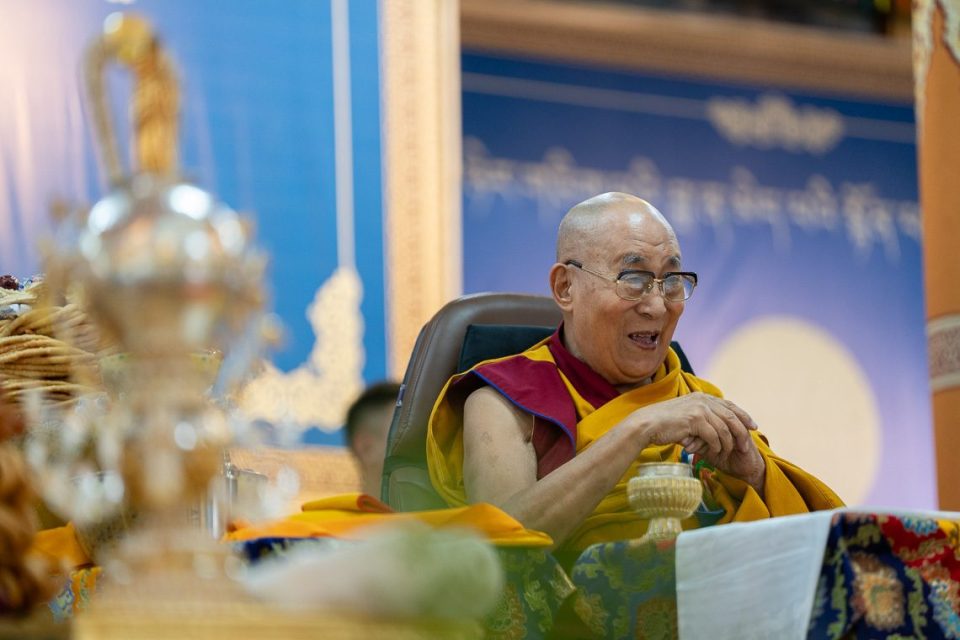
His Holiness smiling during the proceedings of the celebrations in honor of his ninetieth birthday according to the Tibetan calendar (the fifth Tibetan day of the fifth Tibetan month) in the Main Tibetan Temple Courtyard in Dharamsala on June 30, 2025. Photo by Tenzin Choejor, courtesy of DalaiLama.com.
On July 6, students, friends, and supporters around the world will observe the incredibly momentous occasion of His Holiness the Dalai Lama’s ninetieth birthday. We wanted to remind you of the vast resources available to you, to practice in the most beneficial and powerful way possible.
We also wanted to share the statement released by His Holiness on July 2 affirming the continuation of of the institution of the Dalai Lama. An excerpt from His Holiness’s statement reads:
“Although I have had no public discussions on this issue, over the last 14 years leaders of Tibet’s spiritual traditions, members of the Tibetan Parliament in Exile, participants in a Special General Body Meeting, members of the Central Tibetan Administration, NGOs, Buddhists from the Himalayan region, Mongolia, Buddhist republics of the Russian Federation and Buddhists in Asia including mainland China, have written to me with reasons, earnestly requesting that the institution of the Dalai Lama continue. In particular, I have received messages through various channels from Tibetans in Tibet making the same appeal. In accordance with all these requests, I am affirming that the institution of the Dalai Lama will continue.
“The process by which a future Dalai Lama is to be recognized has been clearly established in the 24 September 2011 statement which states that responsibility for doing so will rest exclusively with members of the Gaden Phodrang Trust, the Office of His Holiness the Dalai Lama.” Please read the full statement by His Holiness.
Great Festival Celebrating His Holiness
Lama Zopa Rinpoche offered extensive advice on prayers and practices to do for His Holiness’s birthday, remarking that by doing these prayers and practices, students also benefit their own Dharma practice. You can find Rinpoche’s collected advice in the booklet How to Do the Great Festival of His Holiness’ Birthday in the Best Possible Way.
Long Life Prayers
The PDF booklet Prayers for the Long Life of His Holiness the Dalai Lama and Tibet contains prayers for the long life of His Holiness the Dalai Lama and for Tibet.
Online Teachings by His Holiness
Teachings by His Holiness are usually live streamed, and also available for viewing later as video recordings. DalaiLama.com also has links to live web streams, scheduled events, summaries of events, and more.
Chenrezig (Avalokiteshvara) Practice Materials
His Holiness is respectfully held as a manifestation of Chenrezig (Avalokiteshvara), the buddha of compassion, by his disciples. Prayers to Chenrezig recommended by Lama Zopa Rinpoche can be found on our special page dedicated to Chenrezig practices and mantras.
Please rejoice that over 56 million mantras of OM MANI PADME HUM have been recited through the Mani Mantra Recitation Initiative for His Holiness Dalai Lama’s Long Life from March 1 to June 30, organized by Yeshin Norbu Center, the FPMT Center in Stockholm! We will share a full report on this incredible offering very soon.
May your celebrations and practices honoring His Holiness’s birthday be most joyous and auspicious, and may His Holiness the 14th Dalai Lama of Tibet continue to have a long and stable life, to continue to guide and inspire all sentients in desperate need of his perfect example of compassion, and to dispel all the misery of the world, from lifetime to lifetime without any separation!
Recently shared news regarding His Holiness the Dalai Lama:
- Statement from His Holiness Affirming the Continuation of the Institution of Dalai Lama
- His Holiness’s Birthday Celebration on June 30 in Dharamsala
- In Honor of His Holiness the Dalai Lama’s 90th Birthday: A Heartfelt Offering from the FPMT Organization
- His Holiness the Dalai Lama: The Purpose of Life Is To Be Happy
- Three Buffalos Liberated in Honor of His Holiness the Dalai Lama’s Long Life and 90th Birthday
- The Kindness of His Holiness the Dalai Lama and the Tibetan People
Foundation for the Preservation of Mahayana Tradition (FPMT), is a Tibetan Buddhist organization dedicated to the transmission of the Mahayana Buddhist tradition and values worldwide through teaching, meditation and community service.
- Tagged: his holiness, his holiness the dalai lama
30
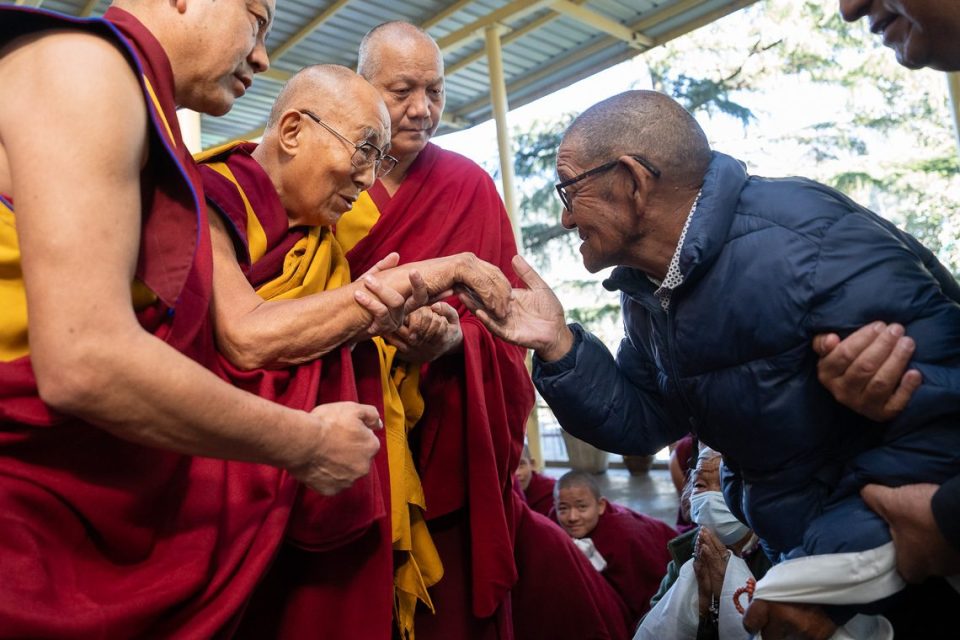
His Holiness greeting an elderly Tibetan man as he makes his way to the main Tibetan temple to participate in a long life puja in Dharamsala, December 6, 2024. Photo by Tenzin Choejor, courtesy of DalaiLama.com.
As His Holiness the Dalai Lama’s ninetieth birthday is approaching on July 6, 2025, we hope to remember the unbelievable and unshakeable kindness of His Holiness. According to the Tibetan calendar, His Holiness’s birthday fell today, the fifth day of the fifth month. Festivities for this occasion took place at the Main Tibetan Temple in Dharamsala organized by the Dhomey Cholkha, people from Amdo. An estimated 7,000 attendees gathered in the Kalachakra Temple and the Tsuglagkhang, the courtyard, as well as Kirti Gompa and the nearby parking lot.
His Holiness shared the following words during the event:
“Here we are today on my 90th birthday, Although I am now 90 years old, I’m physically healthy and well. All these years I’ve worked for the good of Tibetans and the Dharma. I’ve also established links with people around the world and engaged in useful discussions with scientists. My life has been worthwhile. I’ve visited many other countries and met all kinds of people. I feel my life as a human being has been of benefit to the people of the world and I dedicate the rest of my life to the benefit of others.
“As far as the institution of the Dalai Lama is concerned, there will be a framework for it to continue. I was born in Dhomey and moved to Lhasa where I was able to study. As I already said, I think I have been able to serve the Dharma and sentient beings and I am determined to continue to do so.”
One of His Holiness’s core messages to the world is the need for and benefit of cultivating kind-heartedness, “the good heart” as His Holiness says. Today , in honor of his 90th birthday celebration in Dharamsala, we are sharing one of His Holiness’s very practical teachings on this topic. Published in India Today in 2021.
The Purpose of Life Is To Be Happy
By His Holiness the Dalai Lama
The basic source of all happiness is a sense of kindness and warm-heartedness towards others. We are all the same as human beings. We are born the same way, we die the same way, and we all want to lead happy lives.
The key to happiness is peace of mind. This is not something that can be bought. Inner peace has to be cultivated by each of us from within. All our religious traditions, despite whatever philosophical differences there may be among them, carry the same message of love and warm-heartedness that is the foundation of such peace of mind.
I sometimes wish that we were more like children, who are naturally open and accepting of others. Instead, as we grow up, we fail to nurture our natural potential and our sense of fundamental human values. We get caught up in secondary differences and tend to think in terms of ‘us’ and ‘them’. Education can change this. We need to learn to distinguish the destructive nature of emotions like anger, fear and attachment, which disturb our peace of mind, from the positive qualities of compassion that are genuine sources of happiness.
I often ask myself what the purpose of life is. I conclude that it is to be happy. We have no guarantee of what will happen in the future, but we live in hope, which is what keeps us going. There is sometimes insufficient understanding of the difference between sensory consciousness and mental consciousness. The ultimate source of happiness is a mental feeling of joy, and not a wealth of material goods. The sensory pleasure material things provide is generally short-lived. Such satisfaction does little to allay anxiety and fear. On the other hand, mental joy sustains itself.
Nowadays scientists too agree that our basic human nature is compassionate and warm-hearted because that is the way our lives begin. Without our mother’s love and affection we would not have survived. Since we depend on other human beings for our own happiness, it is natural to feel warm-hearted towards them. Human beings are responsive. No matter how beautiful a flower may be, it won’t react to my smile. But if I smile at another human being, she or he generally smiles in return, and even animals react positively.
Today, the world is mostly focused on external development. However, ancient Indian traditions emphasize looking within to find the real source of joy. To be happy it is our minds we must transform. This is the basis of the longstanding traditions of ahimsa, doing no harm, and karuna, wishing others to be free from suffering.
Compassion, an active concern for others’ well-being, is not only part of religion, it also belongs to our lives as human beings. From compassion we develop self-confidence; that brings inner strength, allowing us to act with transparency and candor. If a person is happier, his or her family is happier; if families are happy, neighborhoods and nations will be happy. By each of us working to transform ourselves, we can change our human way of life and make this a century of compassion.
We must continually consider the oneness of humanity, remembering that we all want to be happy. And indeed, everyone has a right to a happy life. Along the way we may be faced with problems, but we must not lose hope. We must keep up our determination without being impatient to achieve quick results.
If you agree with anything I have written here, I hope you will follow it up in your day to day lives. As I have said before, if you want others to be happy, practice compassion, if you want to be happy, practice compassion.
Originally published by India Today, September 30, 2021.
Please also remember that on the joyful occasion of His Holiness the Dalai Lama’s ninetieth birthday, the FPMT organization will be offering one hundred statues of Shakyamuni Buddha to His Holiness! Please rejoice and read more about this offering occurring during a special long life puja for His Holiness on July 5 in Dharamsala.
Lama Zopa Rinpoche offered extensive advice on prayers and practices to do for His Holiness’s birthday, remarking that by doing these prayers and practices, students also benefit their own Dharma practice. You can find Rinpoche’s collected advice in the booklet How to Do the Great Festival of His Holiness’ Birthday in the Best Possible Way.
For more on His Holiness the Dalai Lama and his beneficial activities, please visit DalaiLama.com.
Foundation for the Preservation of Mahayana Tradition (FPMT), is a Tibetan Buddhist organization dedicated to the transmission of the Mahayana Buddhist tradition and values worldwide through teaching, meditation and community service.
- Tagged: his holiness, his holiness the dalai lama
27
June 2025 Enews is Now Available!
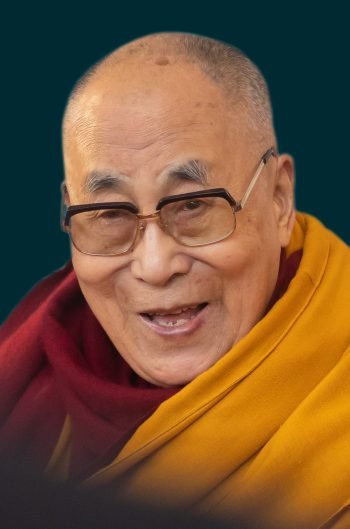
His Holiness the Dalai Lama on the occasion the laying of the foundation stone for The Dalai Lama Centre for Tibet and Indian Ancient Wisdom on the Maitreya land in Bodhgaya, India. Photo by Ven. Lobsang Sherab.
We are delighted to share the June 2025 enews with you. We share many causes for rejoicing including:
- Rejoicing in His Holiness the Dalai Lama’s 90th birthday
- Advice from Lama Zopa Rinpoche: Prayers to stop wars
- Valuable resources for students of Lama Zopa Rinpoche
- A simple explanation of karma by Lama Yeshe
- Pujas and prayers offered on Saka Dawa
- News from FPMT centers
- Opportunities for service, practice, and retreat
and much more!
Please read this month’s enews in its entirety.
Have the e-News translated into your native language by using our convenient translation facility located on the right-hand side of the page.
Visit our subscribe page to receive the FPMT International Office News directly in your email inbox.
- Tagged: fpmt enews
24
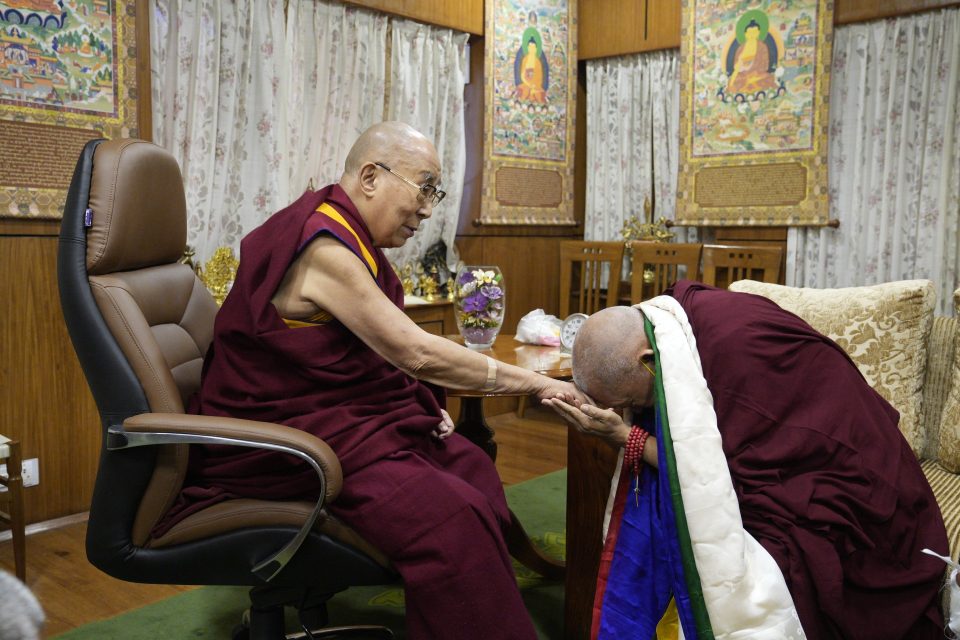
His Holiness meeting with Lama Zopa Rinpoche, Dharamsala, India, November 2, 2022. Photo courtesy of the Office of His Holiness the Dalai Lama.
As His Holiness the Dalai Lama’s ninetieth birthday is approaching on July 6, 2025, we hope to remember the unbelievable and unshakeable kindness of His Holiness.
“I thought that it would be important especially for Western people who had become Buddhist to remember the great kindness they had received from His Holiness the Dalai Lama, Padmasambhava, the Dharma Kings, Shantarakshita and the Tibetan people as a whole,” Lama Zopa Rinpoche said in 2011, explaining his motivation for composing the prayer “Remembering the Kindness of His Holiness the Dalai Lama and the Tibetan People.” This prayer is included in the booklet Prayers for the Long Life of His Holiness the Dalai Lama and Tibet.
“While thinking how important it is, in addition to providing whatever help to Tibet that they can give, for these Westerners to at least direct their thoughts and wishes to the welfare of the Tibetan people, this prayer came to my mind,” Rinpoche said. “I composed it especially for the success of His Holiness the Dalai Lama’s wishes, and in particular for the Tibetan people, and for there to be perfect peace and happiness in the world and for all sentient beings to achieve enlightenment.”

Remembering the Kindness of His Holiness the Dalai Lama and the Tibetan People concludes:
“Our Refuge and Savior, the Supreme One: His Holiness the Dalai Lama
And the Tibetan people have been so kind to us!
Remembering this we make the following dedicating prayers:
May all His Holiness the Dalai Lama’s wishes be successful immediately;
May the Snow Land of Tibet achieve pure freedom
And develop the Buddha Dharma even more than before in Tibet;
And may all mother transmigratory beings achieve enlightenment quickly!”
Lama Zopa Rinpoche offered extensive advice on prayers and practices to do for His Holiness’s birthday, remarking that by doing these prayers and practices, students also benefit their own Dharma practice. You can find Rinpoche’s collected advice in the booklet How to Do the Great Festival of His Holiness’ Birthday in the Best Possible Way.
Please also remember that on the joyful occasion of His Holiness the Dalai Lama’s ninetieth birthday, the FPMT organization will be offering one hundred statues of Shakyamuni Buddha to His Holiness! Please rejoice and read more about this offering occurring during a special long life puja for His Holiness on July 5 in Dharamsala.
For more on His Holiness the Dalai Lama and his beneficial activities, please visit DalaiLama.com.
Foundation for the Preservation of Mahayana Tradition (FPMT), is a Tibetan Buddhist organization dedicated to the transmission of the Mahayana Buddhist tradition and values worldwide through teaching, meditation and community service.
- Tagged: his holiness, his holiness the dalai lama
19
Most Secret Hayagriva: A Deep Connection to FPMT
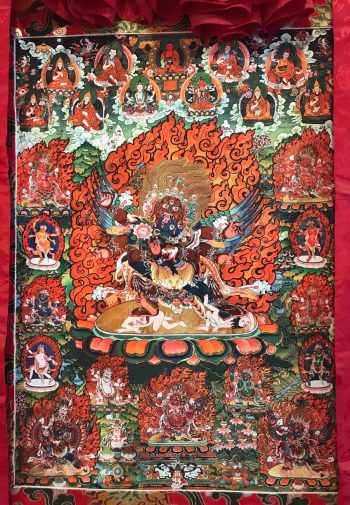
Hayagriva thangka image, courtesy of Nalanda Monastery
Hayagriva is the wrathful manifestation of Chenrezig, the Buddha of Compassion. The practice of Most Secret Hayagriva is extremely powerful to grant help and support and to quickly pacify obstacles. Lama Zopa Rinpoche has said that one of the reasons that Sera Je Monastery has been so successful and able to produce so many qualified teachers, who have very good understanding of Dharma, good hearts, and subdued minds, is due to the blessings—or holy actions—of the deity, Most Secret Hayagriva. Not only outwardly, but also inwardly having great success, this is due to this deity.
The practice of Hayagriva can be traced back to ancient India, to masters such as Mahasiddha Nagarjuna and Guru Rinpoche. It was then developed in Tibet and practiced by other realized beings such as Siddha Darcharwa and the Great Fifth Dalai Lama. The practice was brought to Sera Je Monastery in Lhasa by its founder, Kunkyen Lodro Rinchen Sengge, and has been maintained purely in Tibet. The unbroken lineage continues in Sera Je Monastery in South India, where it is extensively studied and practiced by a group of monks specialized in the practice. The entire Sera Je Monastery performs the Most Secret Hayagriva retreat annually. Both Lama Yeshe and Lama Zopa Rinpoche had a special connection to the Most Secret Hayagriva.
Most Secret Hayagriva Retreat: A Rare Opportunity!
“The Most Secret Hayagriva retreat is the practice/commitment that Lama Yeshe gave to Lama Zopa Rinpoche to do every year for the protection and success of the entire FPMT organization. So now that Rinpoche is no longer with us, we are organizing the group retreat every year for the students to do. This retreat will be held in Nalanda for the first time and then every year in Kopan Monastery as a group retreat. One needs the initiation to attend.” — Ven. Roger Kunsang
Following the Most Secret Hayagriva Initiation that will be given by His Eminence Khensur Rinpoche Lobsang Delek at Nalanda Monastery July 7 and 8, a very rare opportunity of a two-week retreat has been organized on the grounds of Nalanda Monastery starting on July 11. Nalanda has invited four qualified geshes from Sera Je Monastery: Geshe Thubten Sonam (retreat leader), Genden Dhargey (main chant leader of Sera Je), Geshe Dorjee Wangdak (Sera Je chant leader), and Geshe Tashi Dondrup (an artist of butter sculptures and tormas).
Monthly Sponsored Pujas
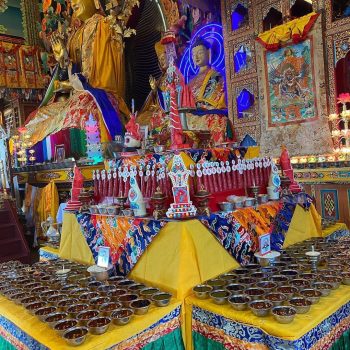
Elaborate tormas for Most Secret Hayagriva puja, Kopan Monastery, 2020.
The FPMT Puja Fund sponsors a monthly Extensive Most Secret Hayagriva puja (Hayagriva Tsog Kong) at Sera Je Monastery, performed by about 40 of the most senior monks who specialize in the practice. This is an all day puja with an elaborate torma offering and extensive prayers and meditation. This puja is dedicated to all FPMT centers, projects, and services; for the success of all Dharma activities and removal of obstacles; to all students who are facing obstacles; to the benefactors of the Puja Fund; and to all beings.
Practice Lineage and New Practice Booklets
There are two initiation lineages of this deity. The “common lineage” is from Guru Rinpoche to Siddha Darchar down through many Sera Je lamas. Lama Zopa Rinpoche gave initiations based on this lineage. The “uncommon lineage” is from the Fifth Dalai Lama Ngawang Lozang Gyatso, who received it in a pure vision and is a part of his Pure Visions Bearing the Seal of Secrecy (Sangwa Gyachen), down to His Holiness the fourteenth Dalai Lama, and more recently Kyabje Jhado Rinpoche.
Most of the Hayagriva practice texts, called “activity manuals (lejang),” are based on the Fifth Dalai Lama’s composition. The Fifth Dalai Lama composed two activity manuals. The extensive one is called The Melody of Fearless Vajra: The Activity Manual for the Chanting and Meditation of Wrathful Most Secret Lotus, and the shorter one, Compendium of the Heart Essence.
FPMT Education Services has recently made available two practice booklets:
- The Melodious Laughter of the Mighty One composed by Dagri Lozang Thubten Namgyal (19th century) is based on Compendium of the Heart Essence with additions from Melody of Fearless Vajra. This activity manual is used when the entire Sera Je Monastery does their annual Hayagriva retreat.
- A Concise and Complete Sadhana of Bhagavan Wrathful Glorious Most Secret Hayagriva compiled by Jhado Rinpoche is based on Melody of Fearless Vajra and is meant for daily practice or for the intermediate sessions of an approach retreat.
We gratefully thank Nalanda Monastery for sponsoring the translation of these two major sadhanas which will be used in the retreat at Nalanda Monastery.
These booklets can be practiced by those who have received either the common or uncommon initiations.
Practice of the Most Secret Hayagriva Mantra
Lama Zopa Rinpoche says the Hayagriva practice reciting the mantra is very powerful. “My suggestion is to recite it. It helps numberless sentient beings and yourself from sickness and untimely death and never get born in lower realms.” Practicing Hayagriva can help, “pacify the outer and inner obstacles for actualizing the path to enlightenment and success in Dharma practice, in serving the teachings of the Buddha, and serving sentient beings.” Rinpoche says that when reciting the mantra, you can think about purifying sickness, spirit harm, negative karma, defilements, and the imprints of oneself and all sentient beings, and also collecting the attainments of the holy body, holy speech, and holy mind. You can also recite the mantras doing meditation on the four activities: peaceful, increasing, controlling, and wrathful. These are all done with the motivation of attaining enlightenment for the benefit of sentient beings.
To do the mantra practice, you must have received the Most Secret Hayagriva initiation, or an oral transmission of the mantra, or, at the minimum, special permission from a qualified guru.
For more information about the Most Secret Hayagriva Retreat at Nalanda Monastery June 11- 28, 2025, please visit Nalanda’s website.
Foundation for the Preservation of Mahayana Tradition (FPMT), is a Tibetan Buddhist organization dedicated to the transmission of the Mahayana Buddhist tradition and values worldwide through teaching, meditation and community service.
- Tagged: hayagriva, most secret hayagriva
18
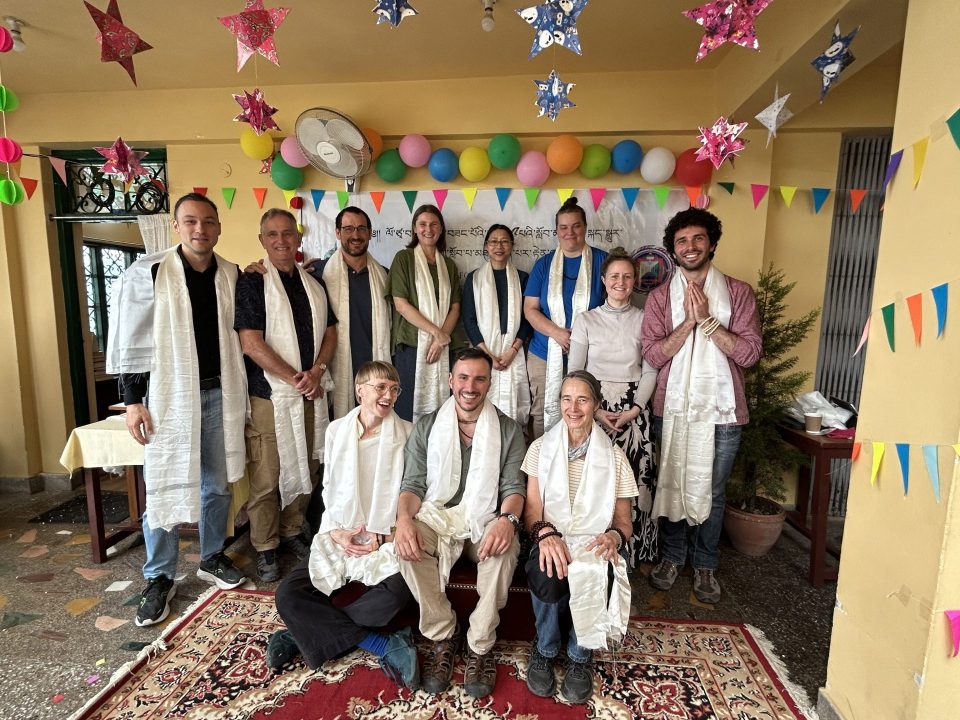
Eleven graduates of LZRTP 9 program.
Lotsawa Rinchen Zangpo Translator Program (LRZTP) is an FPMT project in Dharamsala, Himachal Pradesh, India. LRZTP has produced many gifted Dharma interpreters-translators for FPMT Dharma centers since its conception over twenty-three years ago. In addition to the two-year intensive training program, LRZTP also runs short Tibetan language courses and offers private online Tibetan language lessons.
The latest interpreters training course, LRZTP9, successfully finished with eleven new graduates on June 3, 2025! We are happy to share this report from LRZTP on this achievement:
After two years of hard work and dedication the students of LRZTP 9 can finally say: yes, we have made it! Lotsawa Rinchen Zangpo school’s ninth two-year Tibetan language program has now come to an end. The group of eleven students who came to Dharamsala in 2023 from all over the world are now happy graduates of one of the most demanding programs in the world of Tibetan language studies.
As is usually the case the students started their adventure with LRZTP from different levels. There were beginners, there were those who had already studied some Tibetan and there were those who at the beginning of the program were already quite advanced either in language or Dharma studies. In the end Lotsawa Rinchen Zangpo Translator Program is happy to announce that the latest graduates come from: Australia, Germany, Israel, Sweden, Poland, United States and Argentina.
The final module of the two-year program (Module 9) differed somewhat in terms of the contents when compared to previous modules of the second year. The main feature of the last module was the interpretation (oral translation) workshop. There were four days each week devoted to the interpretation practice. On two days half of the class was theory of interpretation, the other half was practice. Not all of these days were mandatory, but addressed to those whose main aim was learning to interpret the Dharma teachings between Tibetan and English (or their mother tongue). Additionally, now upon the official graduation, those who are interested have been attending an extra interpretation workshop three times a week, which will be going on until the monsoon break in the latter part of July.
The main guest teacher in Module 9 was Geshe Losang Drakpa who taught Introduction to Tantra and on the dissolution stage. We are very grateful to Geshe-la and to all the guest teachers who visited in the course of LRZTP 9 for devoting their time to the students. Geshe Losang Drakpa was also one of the honorary guests at the graduation ceremony.
The graduation ceremony was preceded by an audience with His Holiness the Dalai Lama at His residence in McLeod Ganj. The next day, 3rd June, the actual graduation was organized at school. All students, all teachers, guest teachers and staff were invited to attend. The ceremony began with prayers, serving of tea and traditional sweet rice, followed by the official welcome of all guests by Julia Wilson, the Program Coordinator.
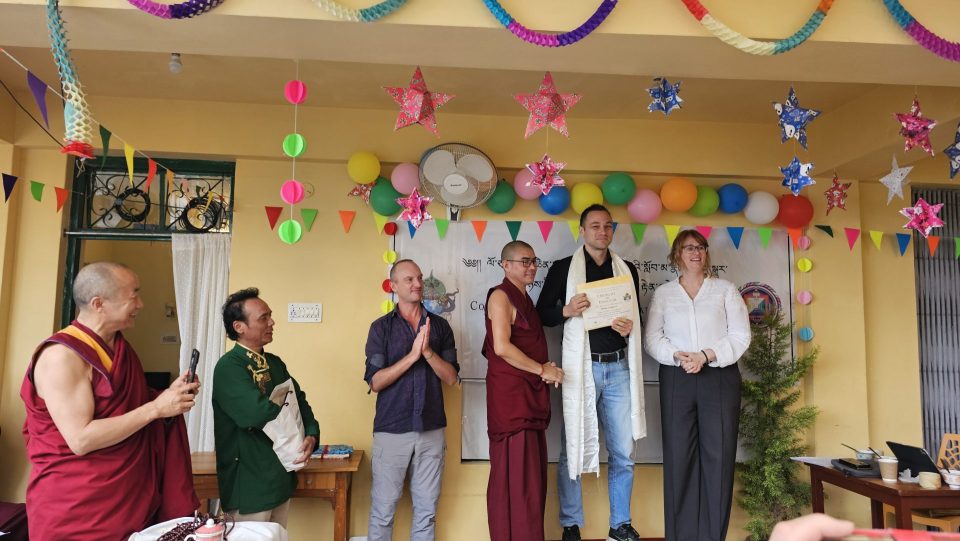
LRZTP 9 students came to the stage to proudly receive their well deserved certificates as well as some small graduation gifts.
Several of the main teachers, including the special guest teacher Geshe Losang Drakpa, then took the stage to address the happy graduates. After all the well wishes and congratulations, students one by one came to the stage to proudly receive their well deserved certificates as well as some small graduation gifts. Finally, the students themselves, gave small individual speeches and were later interviewed in Tibetan by the reporters of Tibet Express.
The official part of the ceremony ended with a delicious lunch prepared for the occasion by the school’s wonderful cooks. Later, everyone had tea and cakes and engaged in individual conversations.
We would like to stress here how much of hard work the students have put into their learning in LRZTP. It took great effort on their part to not only master the extensive material of the two years but also to gain confidence as future translators and interpreters of Tibetan language and Dharma teachings. Everyone did a wonderful job and we are very proud of all the graduates. They all did really well in the course and will certainly be brilliant lotsawas if they only choose to. They will also carry on the good name of the Lotsawa Rinchen Zangpo Translator Program into the world.
In October of 2025 the next two-year program – LRZTP 10 – will begin. The registration is still open. Anyone who has been seriously thinking of joining but has not yet registered, is most welcome to do it. The online and at-school individual classes still continue, so if you feel like two years is too long or you have other goals, check the LRZTP website and consider joining these individual one-on-one teacher-student meetings.
Foundation for the Preservation of Mahayana Tradition (FPMT), is a Tibetan Buddhist organization dedicated to the transmission of the Mahayana Buddhist tradition and values worldwide through teaching, meditation and community service.
12
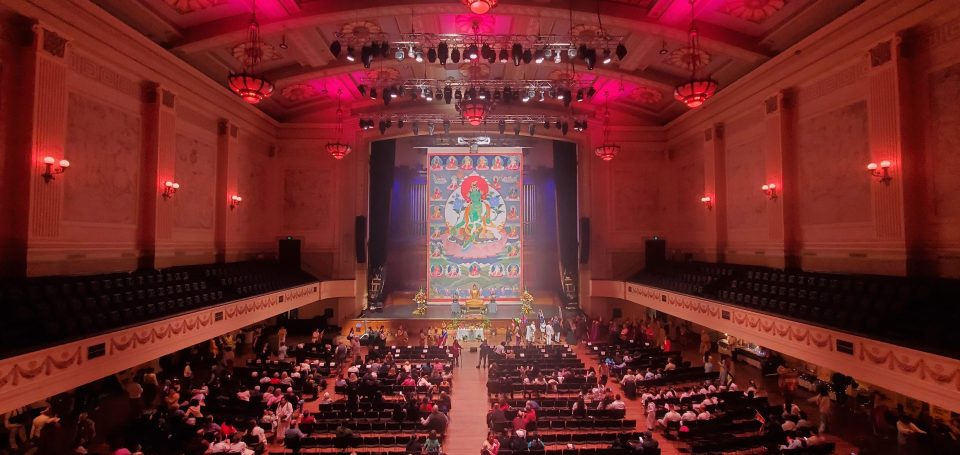
Twenty-One Taras on display at the Melbourne Town Hall. Photo by Gina Lewis.
In 2014, Lama Zopa Rinpoche requested Peter Iseli to paint a very big ( 15 meters x 9 meters, 49 ft x 30 ft) Twenty-One Taras thangka. Peter and his wife Jangchub Iseli-Sangmo spent four years creating the thangka, one section at a time, in a studio at Institut Vajra Yogini in France. At the end of 2017, Lama Zopa offered this thangka to Tara Institute (TI) in Melbourne, Australia, “to show to as many people as possible.”. In 2019 Peter made final changes requested by Rinpoche. For the third year in a row, this thangka was displayed at the Melbourne Town Hall during the annual multicultural Vesak celebrations.
Cynthia Karena shares the details of this year’s event:
In the early morning pre-dawn hours of Saturday May 3, a dedicated group of volunteers gathered to maneuver a heavy 9.5 meter (31 ft) tube containing our giant Twenty-One Taras Thangka through Tara Institute onto a waiting truck outside.
After its initial ‘unveiling’ in 2018 at the prestigious White Night festival in Melbourne, Tara Institute has most recently displayed the 21 Taras Thangka as part of the annual multicultural Vesak celebrations at the Melbourne Town Hall for the past three years.
We arrived at the Town Hall just at sunrise, where we began unrolling and hoisting the thangka, once again releasing the Taras! It’s always a beautiful experience watching the thangka flutter and rise, slowly revealing the Taras row by row. This year’s event coincided with election day in Australia, so seeing the Taras was a good purifying antidote to all the madness of the election campaign.
Many of us here at Tara Institute see the Twenty-One Taras Thangka as a precious connection with Lama Zopa Rinpoche. Not only did he give us this magnificent thangka, but he was with the thangka every day for a month at his 2018 retreat when it hung inside the Great Stupa in Bendigo. “It’s wonderful to be here. You can really feel the presence of Rinpoche,” says TI member Carol Malina.
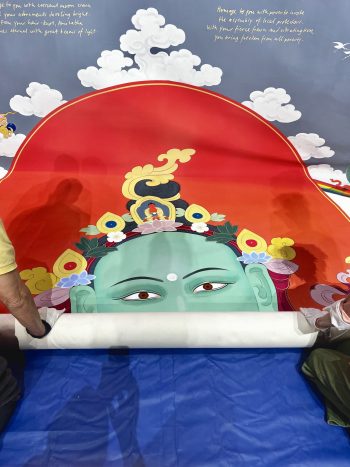
Rolling of the thangka. Photo by Cynthia Karena.
Many people walked in off the street and were amazed by these beautiful “Buddhist goddesses’,” and staff from the Melbourne Tourist Office two doors down kept coming in to ask questions or to just sit and gaze at the thangka. One woman said she sat for an hour because she couldn’t stop looking at the Taras. This year, we also did a public group recitation of the Twenty-One Tara praises, which was moving and powerful with the thangka towering in front of us.
At the end of the day, rolling up the thangka is another technical exercise. Due to the immense size, it takes at least an hour to roll up, as we need to smooth out developing wrinkles with each roll, and make sure we roll straight to avoid overhang, which is easy to do when there is 15 meters of fabric to roll onto a 9 meter long tube! But the upside is that we are up close and personal with each Tara, able to see in detail the extraordinary work Peter has created.
With grateful thanks to Cynthia Karena for this report!
Several FPMT centers have commissioned large thangkas and are now hosting festival days where these holy objects can be enjoyed. We invite you to rejoice in the displaying of these magnificent holy objects which was one of Lama Zopa Rinpoche’s Vast Visions for the FPMT organization. As Rinpoche has explained, doing this makes it “so easy for sentient beings to purify their heavy negative karma and making it so easy for sentient beings to create extensive merit. Which makes it so easy to achieve the realizations of the path and so easy to achieve liberation and enlightenment.”
Foundation for the Preservation of Mahayana Tradition (FPMT), is a Tibetan Buddhist organization dedicated to the transmission of the Mahayana Buddhist tradition and values worldwide through teaching, meditation and community service.
- Tagged: holy objects, large thangka, tara institute
- Home
- News/Media
- Study & Practice
- About FPMT Education Services
- Latest News
- Programs
- New to Buddhism?
- Buddhist Mind Science: Activating Your Potential
- Heart Advice for Death and Dying
- Discovering Buddhism
- Living in the Path
- Exploring Buddhism
- FPMT Basic Program
- FPMT Masters Program
- FPMT In-Depth Meditation Training
- Maitripa College
- Lotsawa Rinchen Zangpo Translator Program
- Universal Education for Compassion & Wisdom
- Online Learning Center
- Prayers & Practice Materials
- Overview of Prayers & Practices
- Full Catalogue of Prayers & Practice Materials
- Explore Popular Topics
- Benefiting Animals
- Chenrezig Resources
- Death & Dying Resources
- Lama Chopa (Guru Puja)
- Lama Zopa Rinpoche: Compendium of Precious Instructions
- Lama Zopa Rinpoche: Life Practice Advice
- Lama Zopa Rinpoche Practice Series
- Lamrim Resources
- Mantras
- Prayer Book Updates
- Purification Practices
- Sutras
- Thought Transformation (Lojong)
- Audio Materials
- Dharma Dates – Tibetan Calendar
- Translation Services
- Publishing Services
- Teachings and Advice
- Find Teachings and Advice
- Lama Zopa Rinpoche Advice Page
- Lama Zopa Rinpoche: Compendium of Precious Instructions
- Lama Zopa Rinpoche Video Teachings
- ༧སྐྱབས་རྗེ་བཟོད་པ་རིན་པོ་ཆེ་མཆོག་ནས་སྩལ་བའི་བཀའ་སློབ་བརྙན་འཕྲིན།
- Podcasts
- Lama Yeshe Wisdom Archive
- Buddhism FAQ
- Dharma for Young People
- Resources on Holy Objects
- Ways to Offer Support
- Centers
- Teachers
- Projects
- Charitable Projects
- Make a Donation
- Applying for Grants
- News about Projects
- Other Projects within FPMT
- Support International Office
- Projects Photo Galleries
- Give Where Most Needed
- FPMT
- Shop
Translate*
*powered by Google TranslateTranslation of pages on fpmt.org is performed by Google Translate, a third party service which FPMT has no control over. The service provides automated computer translations that are only an approximation of the websites' original content. The translations should not be considered exact and only used as a rough guide.We should train ourselves not to become engrossed in any of the thoughts continuously arising in our mind. Our consciousness is like a vast ocean with plenty of space for thoughts and emotions to swim about and we should not allow our attention to be distracted by any of them.






